Special Report
How Each State Is Managing Schools During the Pandemic
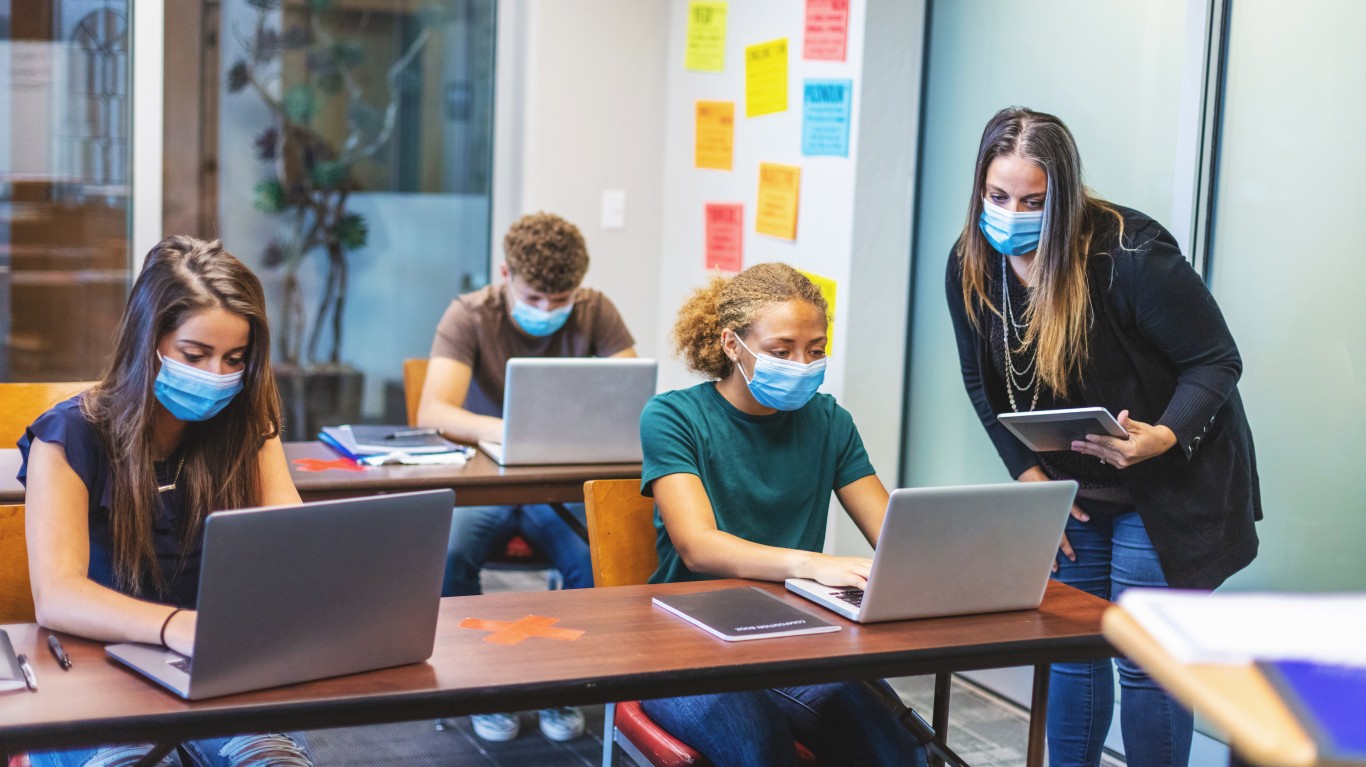
Published:
Last Updated:

As coronavirus cases continue to rise across the U.S. school districts all over the country have developed plans to deal with potential outbreaks in their schools — and the measures school officials take to contain the spread change almost daily.
24/7 Wall St. reviewed guidelines released by state governors and health and education departments as well as news articles to create a current list of school restrictions and re-closures in every state.
Daily temperature checks at the door, mask wearing, and staying socially distant have been the new normal since the first day of the academic year. Students, teachers, and parents alike have by now also became accustomed to sudden closures after someone at the schools tests positive for COVID-19
In an effort to make school closures more predictable, many school districts have established a threshold for the number of confirmed COVID-19 cases per student and staff. That way, parents know if a closure is imminent and can prepare in advance. Some schools have started administering COVID-19 rapid tests as a way to minimize the risk of transmission and remain open.
In a few states, schools don’t have to close and students or staff don’t even have to quarantine if the people who have been exposed to COVID-19 were wearing masks and are not exhibiting any of the disease’s symptoms.
With the coronavirus pandemic still wreaking havoc in nearly every state in the country, switching to remote learning until further notice has increasingly been an option. And with vaccination campaigns underway, teachers in some states have asked that schools close for in-person instruction until staff are able to get the shot.
The second year of the coronavirus pandemic is perhaps more optimistic as millions of people across the country have already been vaccinated. Still, school life may not go back to pre-COVID-19 normalcy soon — here are 20 major myths about COVID-19.
Click here to see how each state is managing schools during the pandemic.
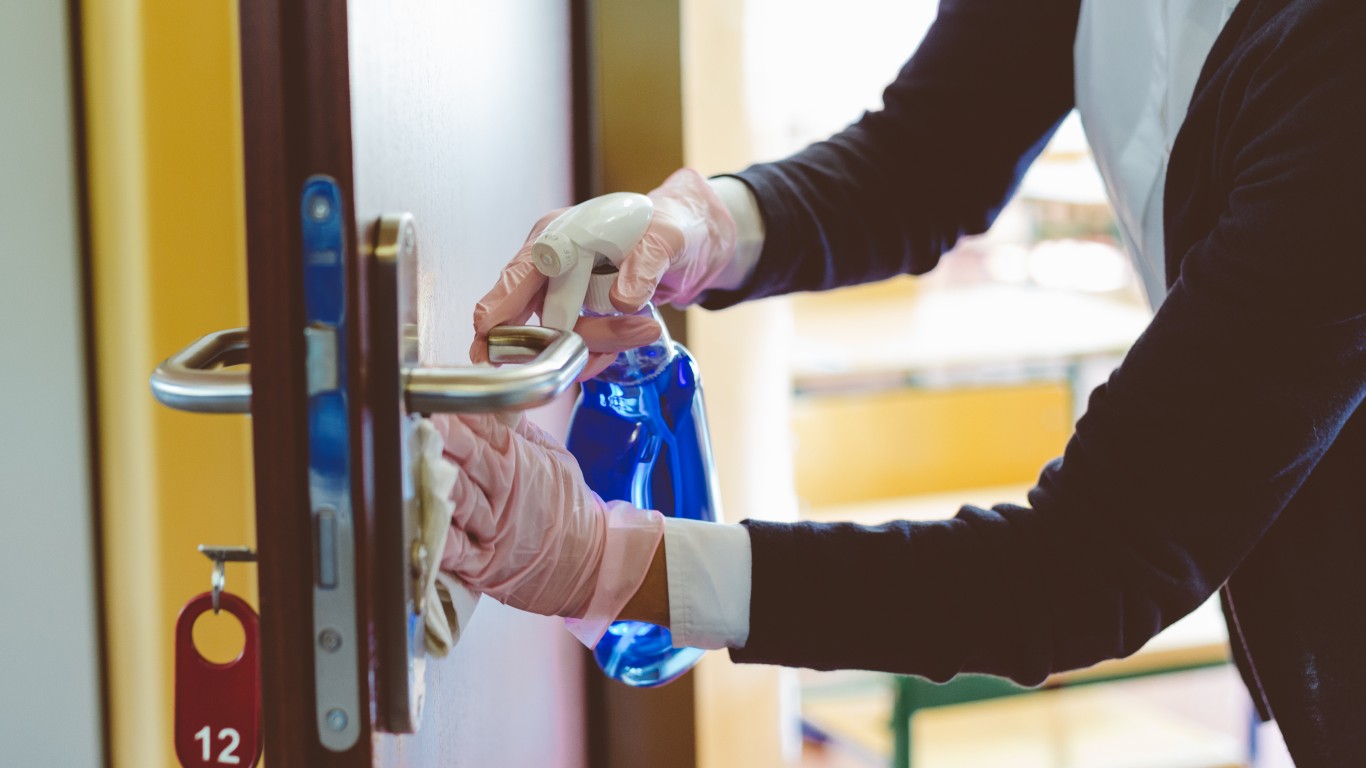
Alabama
> Measures taken: Several counties delayed the start of in-person instruction in the second semester by at least a week. Calhoun County Schools moved online full-time.
> Health screening recommendations: Daily temperature checks
> COVID-19 cases as of Jan 26: 9,123 per 100,000 people — 15th highest (total: 445,909)
> Change avg. daily cases, Jan 18 – Jan 25: 4.5% — 25th largest increase (from 424,028 to 443,009)
> Population: 4.9 million
[in-text-ad]
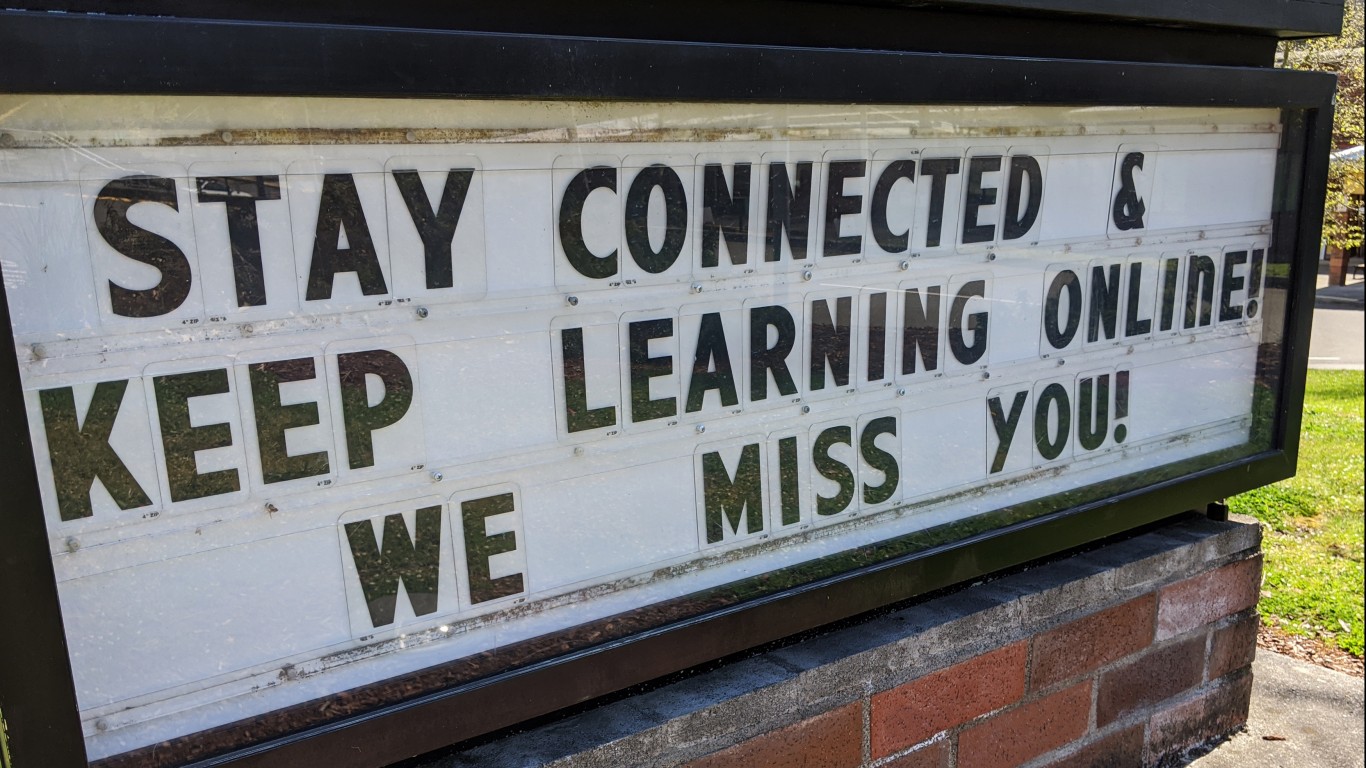
Alaska
> Measures taken: Anchorage School District delayed in-person instruction until Jan 19. Some teachers asked for delays until they got vaccinated.
> Health screening recommendations: Daily temperature and symptom screening for all
> COVID-19 cases as of Jan 26: 7,241 per 100,000 people — 17th lowest (total: 53,399)
> Change avg. daily cases, Jan 18 – Jan 25: 2.5% — 6th smallest increase (from 52,093 to 53,399)
> Population: 737,000
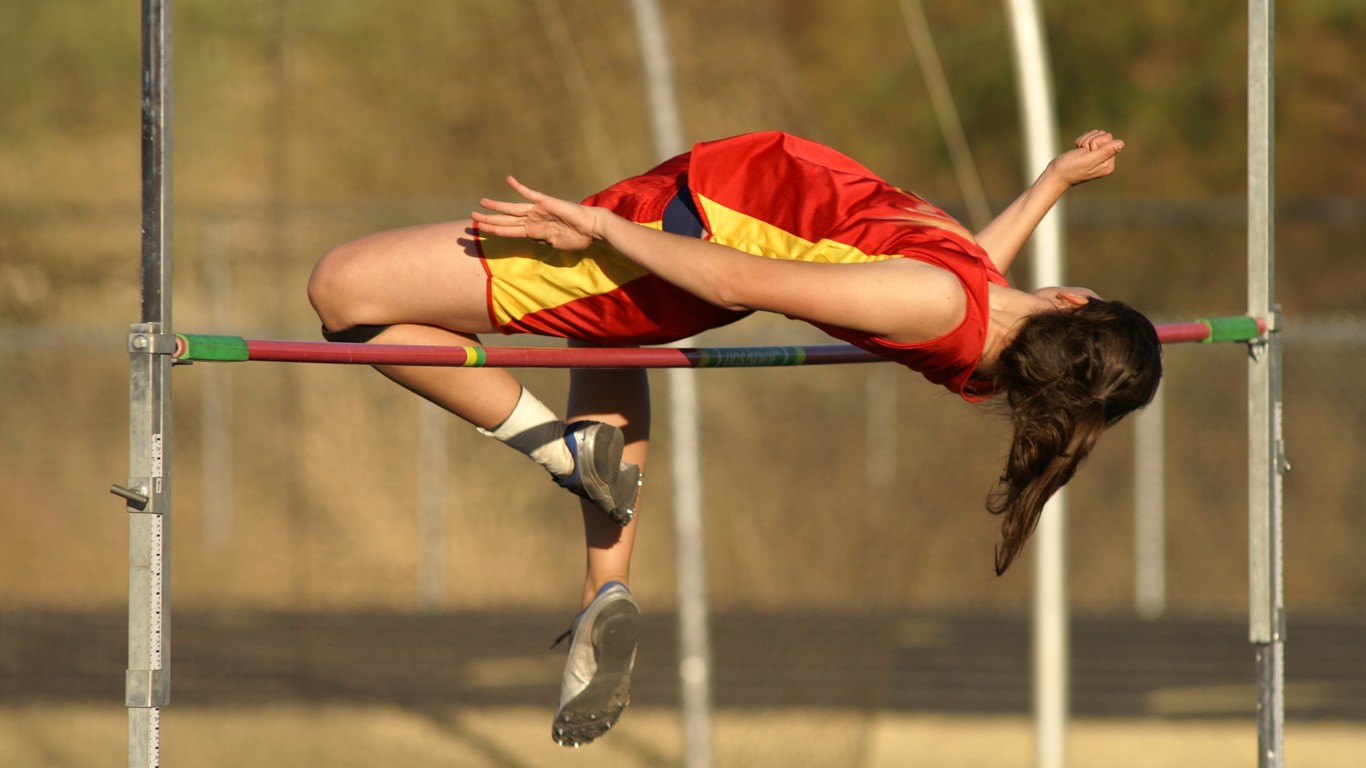
Arizona
> Measures taken: The largest public school district moved to remote learning. Teachers in Peoria Unified School District staged a sickout protesting in-person learning. K-12 teachers are getting vaccinated.
> Health screening recommendations: Daily symptom screening and temperature checks
> COVID-19 cases as of Jan 26: 10,216 per 100,000 people — 6th highest (total: 732,643)
> Change avg. daily cases, Jan 18 – Jan 25: 7.2% — 8th largest increase (from 679,282 to 727,895)
> Population: 7.2 million
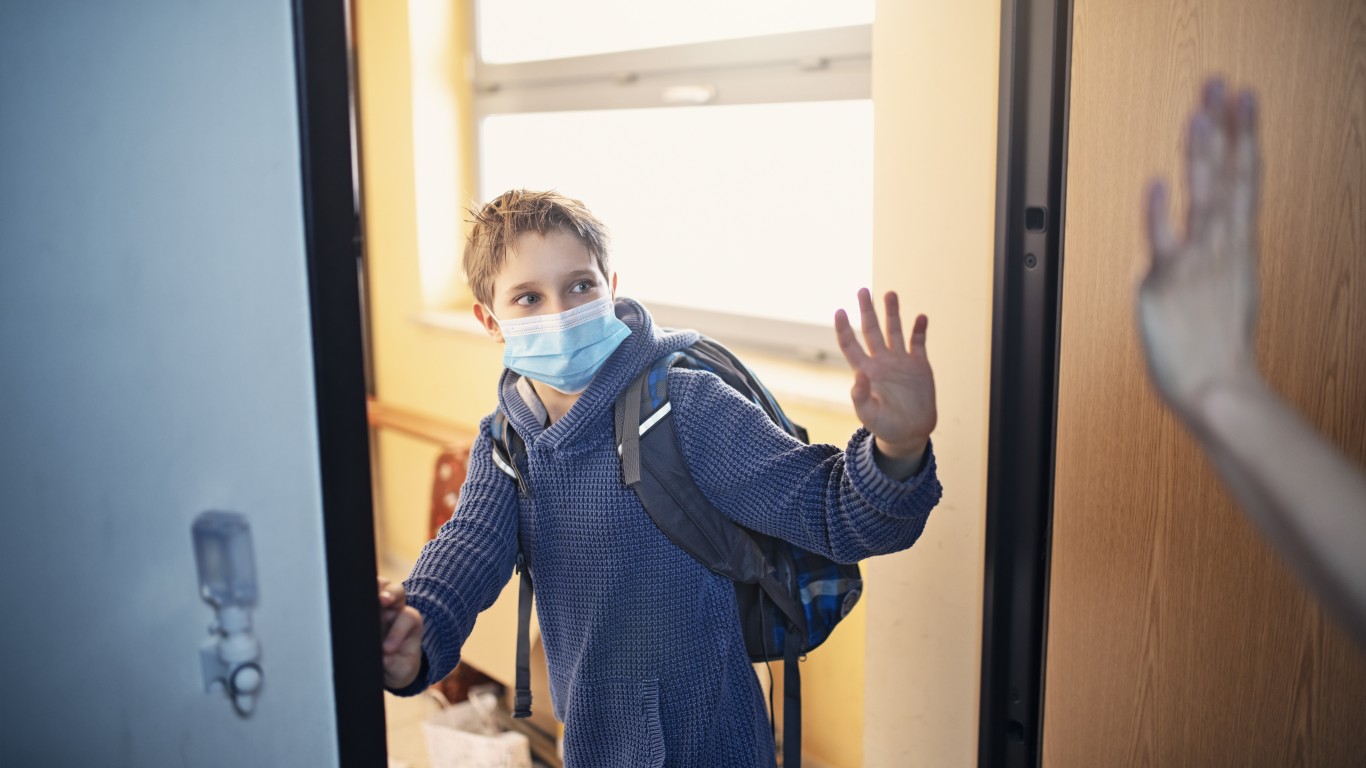
Arkansas
> Measures taken: Dozens of schools have moved to remote learning. At least one school in Earle School District went remote indefinitely. Educators have been able to get vaccinated as of Jan 18.
> Health screening recommendations: To have screening stations and screening signs
> COVID-19 cases as of Jan 26: 9,529 per 100,000 people — 10th highest (total: 287,187)
> Change avg. daily cases, Jan 18 – Jan 25: 4.6% — 22nd largest increase (from 272,263 to 284,702)
> Population: 3.0 million
[in-text-ad-2]
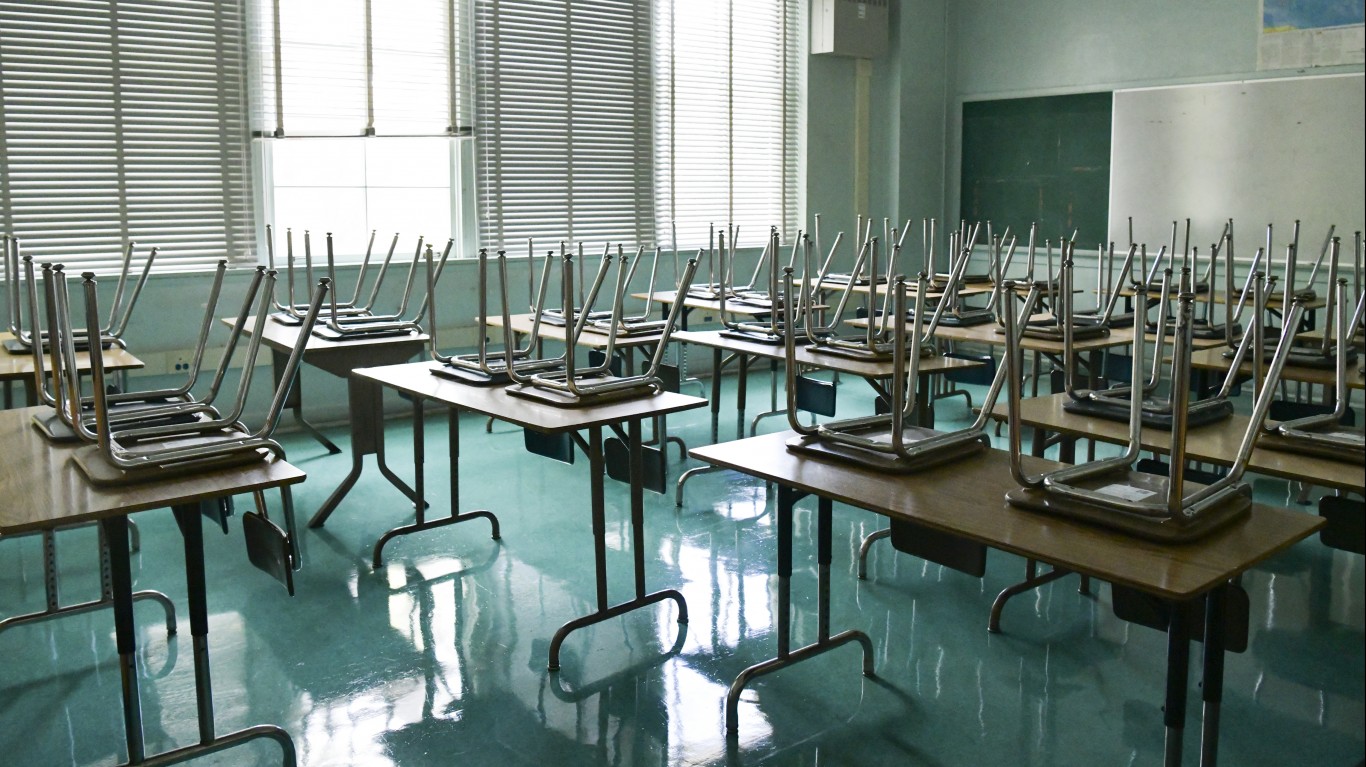
California
> Measures taken: Almost all K-12 students are in the purple “widespread” tier and can’t begin offering in-person instruction. Schools are required to close when 5% of staff and students test positive for COVID-19 within a 14-day period.
> Health screening recommendations: Daily symptom screening and temperature checks, hand-washing required before entering school
> COVID-19 cases as of Jan 26: 7,971 per 100,000 people — 25th highest (total: 3,153,186)
> Change avg. daily cases, Jan 18 – Jan 25: 5.5% — 17th largest increase (from 2,973,174 to 3,136,158)
> Population: 39.6 million
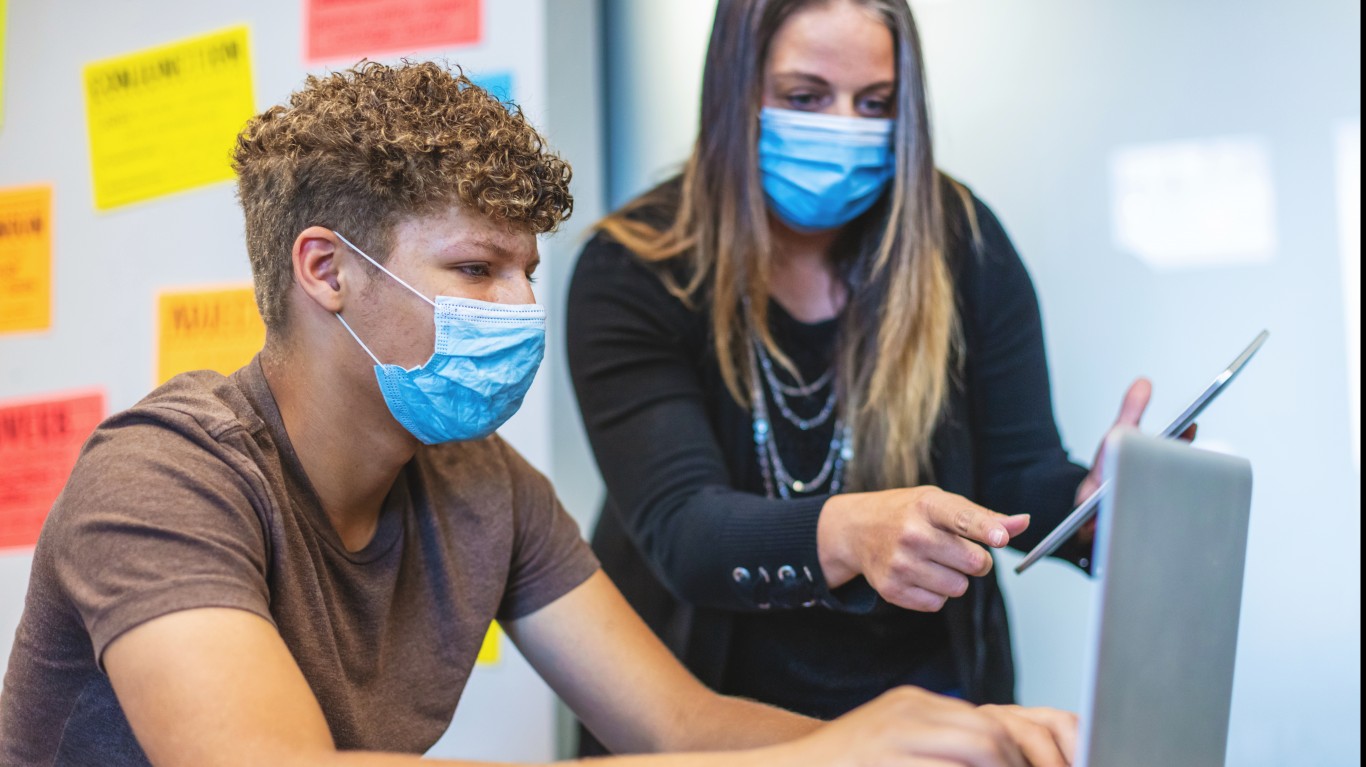
Colorado
> Measures taken: Many of the biggest school districts in Colorado are fully remote. Public schools in Denver started the spring semester remotely, planning to phase kids back into classrooms by Feb 1. Outbreaks at schools are back at Nov 2020 surge levels.
> Health screening recommendations: At-home or on-site symptom screening and temperature checks
> COVID-19 cases as of Jan 26: 6,803 per 100,000 people — 12th lowest (total: 387,462)
> Change avg. daily cases, Jan 18 – Jan 25: 3.0% — 13th smallest increase (from 374,981 to 386,285)
> Population: 5.7 million
[in-text-ad]
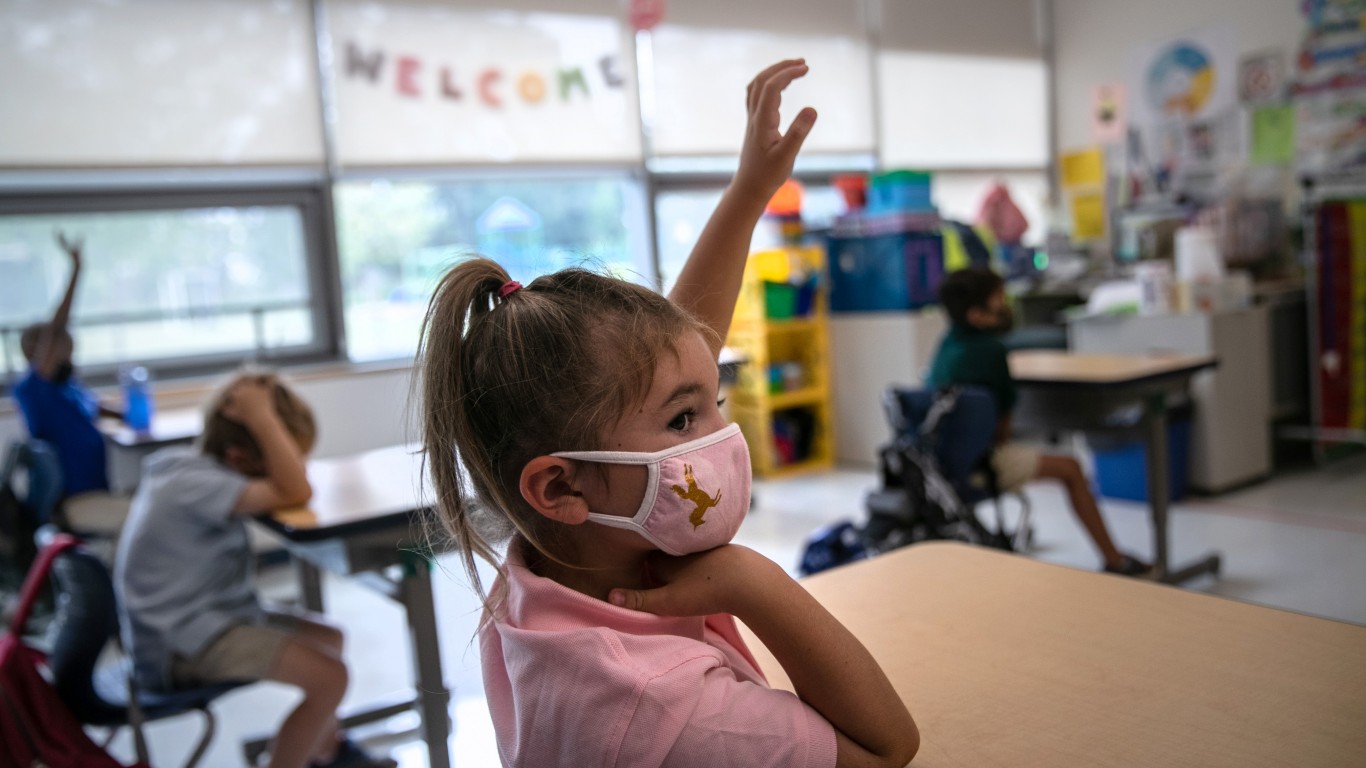
Connecticut
> Measures taken: Schools are advised to close if they are in an area with an average of 25+ new cases per 100K residents in a week.
> Health screening recommendations: To maximize social distancing and for students to bring their own water
> COVID-19 cases as of Jan 26: 6,819 per 100,000 people — 13th lowest (total: 243,632)
> Change avg. daily cases, Jan 18 – Jan 25: 5.9% — 12th largest increase (from 230,125 to 243,632)
> Population: 3.6 million
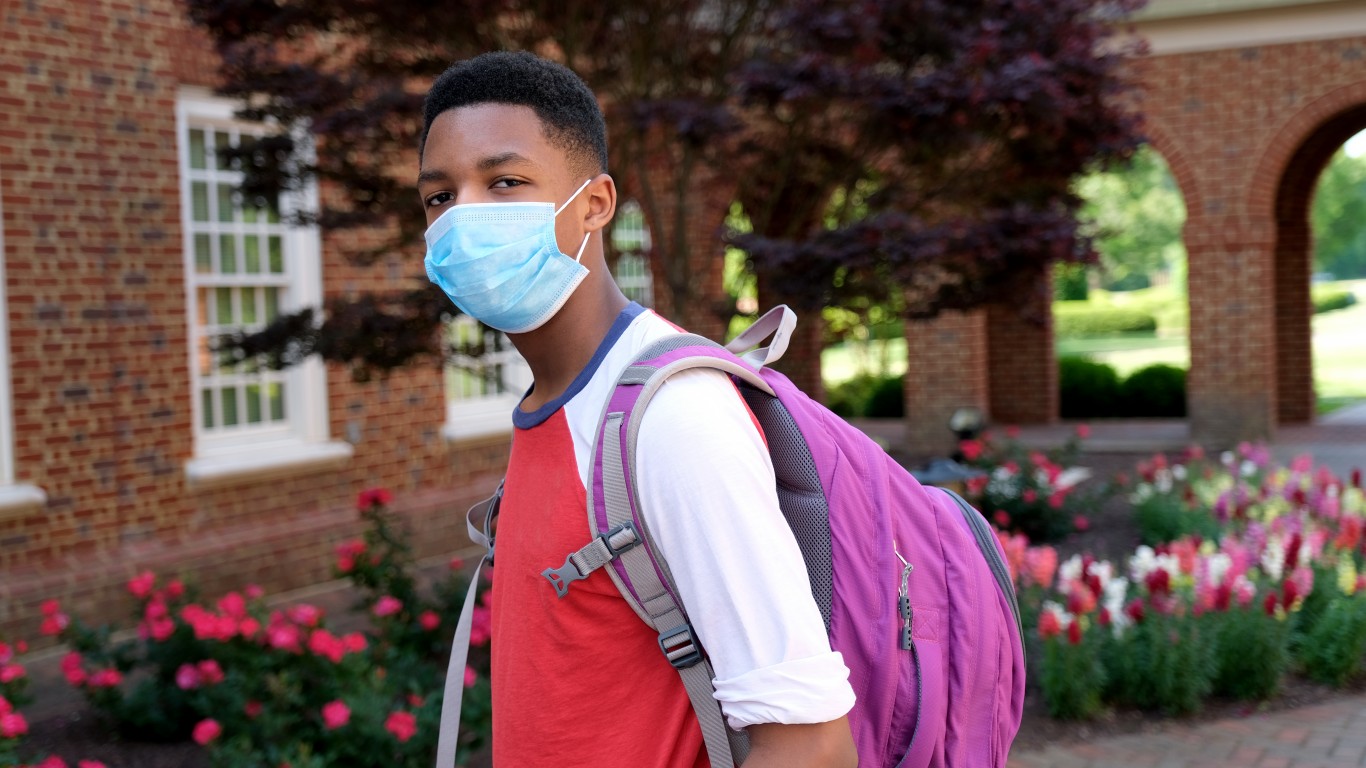
Delaware
> Measures taken: Hybrid learning returned on Jan. 11. Sports competitions have been canceled.
> Health screening recommendations: Daily symptom screening and temperature checks at home. The state will provide testing for staff and students
> COVID-19 cases as of Jan 26: 7,805 per 100,000 people — 23rd lowest (total: 75,490)
> Change avg. daily cases, Jan 18 – Jan 25: 6.0% — 11th largest increase (from 70,910 to 75,191)
> Population: 967,000
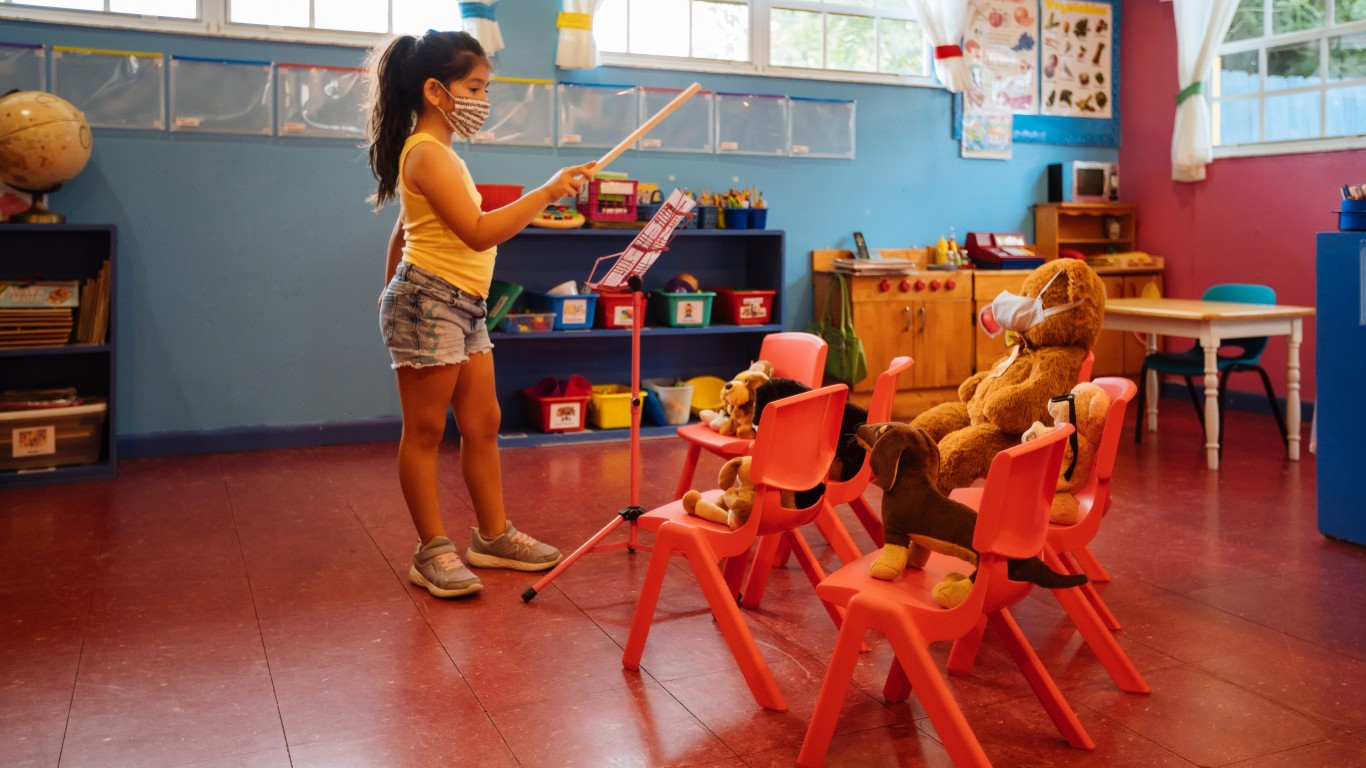
Florida
> Measures taken: An executive order has been issued extending remote and hybrid learning options. Public schools in Polk County have seen a spike in coronavirus cases in January.
> Health screening recommendations: To set up secondary clinic for kids showing symptoms
> COVID-19 cases as of Jan 26: 7,830 per 100,000 people — 25th lowest (total: 1,667,763)
> Change avg. daily cases, Jan 18 – Jan 25: 5.0% — 20th largest increase (from 1,579,281 to 1,658,169)
> Population: 21.3 million
[in-text-ad-2]
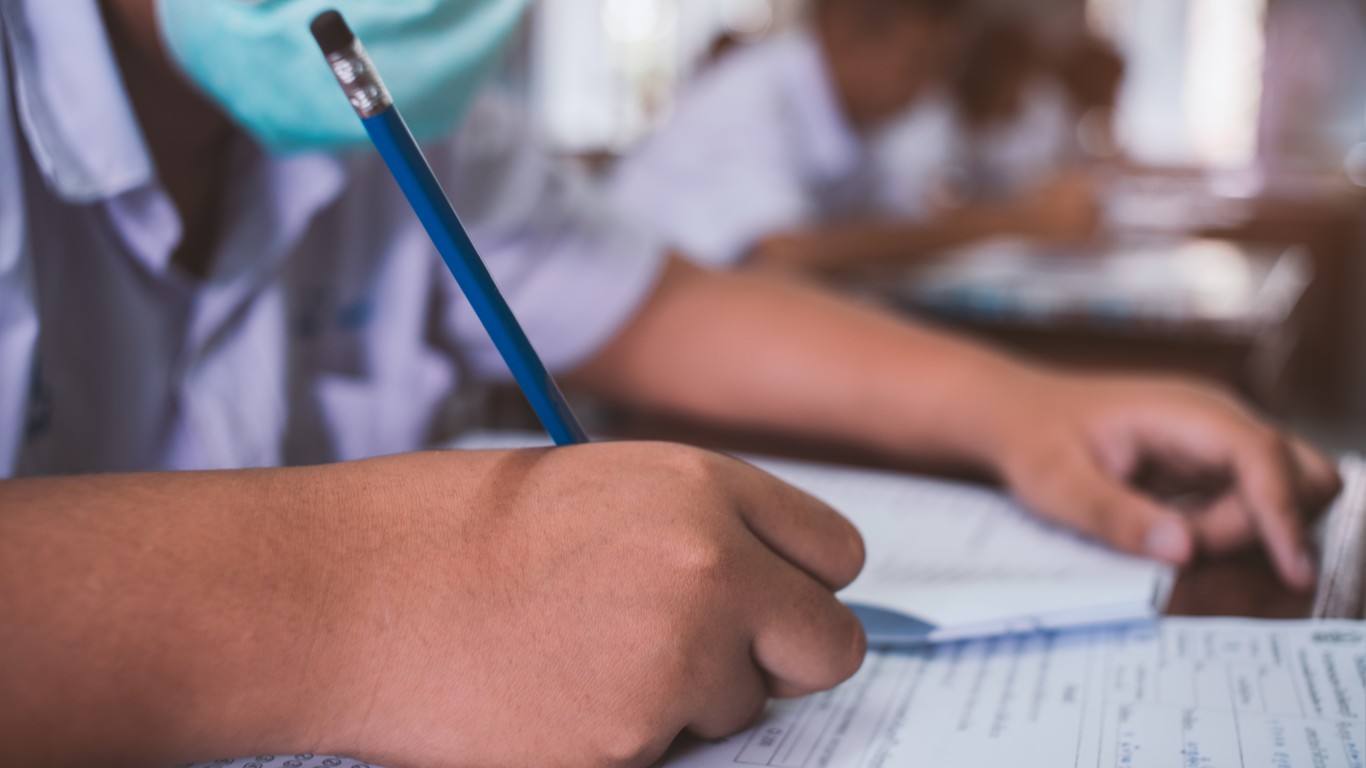
Georgia
> Measures taken: Atlanta Public Schools, the largest school district in the state, delayed reopening for in-person instruction. Students in grades 3-12 will gradually return to classrooms starting Feb 8.
> Health screening recommendations: Daily temperature checks for all
> COVID-19 cases as of Jan 26: 6,918 per 100,000 people — 15th lowest (total: 727,752)
> Change avg. daily cases, Jan 18 – Jan 25: 5.4% — 18th largest increase (from 684,763 to 722,062)
> Population: 10.5 million
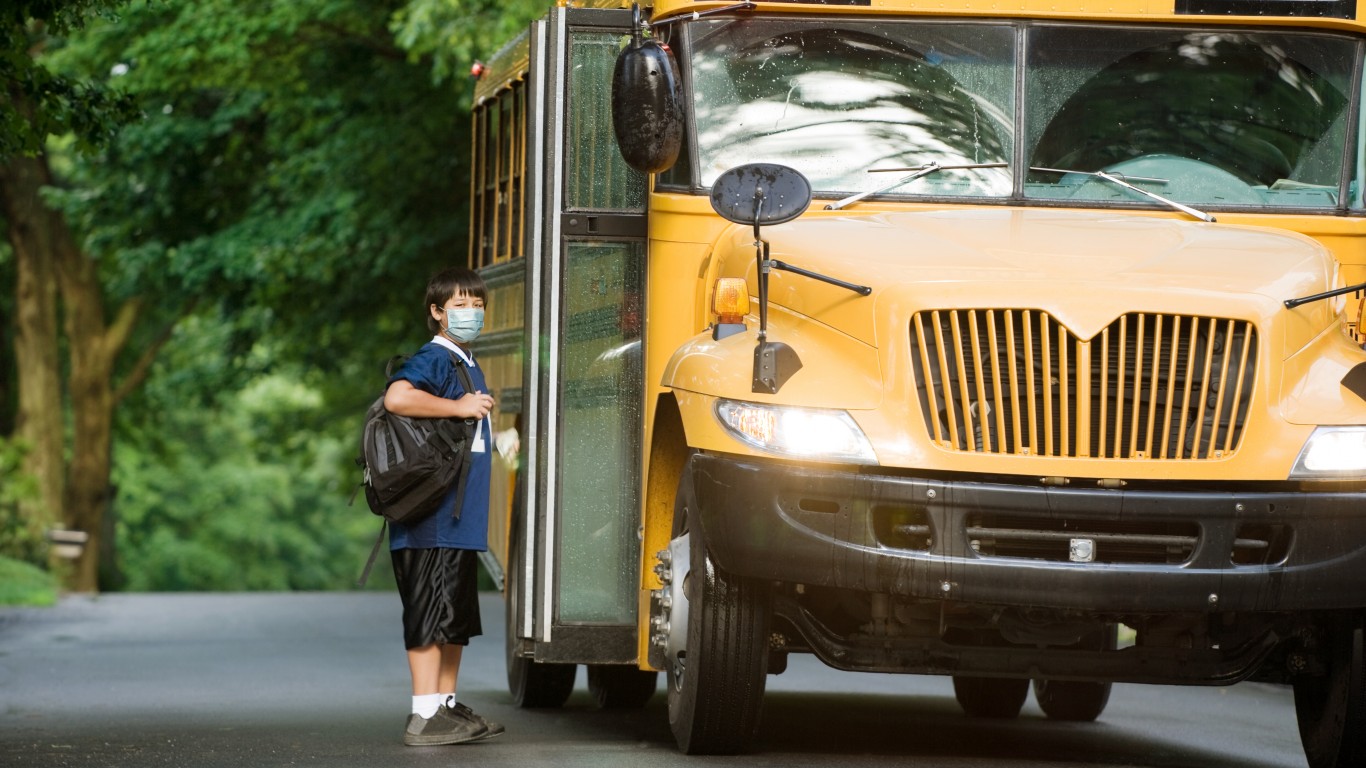
Hawaii
> Measures taken: Some schools are extending the first phase of reopening for in-person instruction, which consists of half-day classes for vulnerable students.
> Health screening recommendations: Daily symptom screenings
> COVID-19 cases as of Jan 26: 1,779 per 100,000 people — the lowest (total: 25,275)
> Change avg. daily cases, Jan 18 – Jan 25: 3.2% — 15th smallest increase (from 24,482 to 25,275)
> Population: 1.4 million
[in-text-ad]

Idaho
> Measures taken: All schools in Boise School District went fully remote until mid-January. The Emmett School District now requires all students and staff to wear masks.
> Health screening recommendations: Daily symptom screening and temperature checks for all
> COVID-19 cases as of Jan 26: 9,123 per 100,000 people — 14th highest (total: 160,033)
> Change avg. daily cases, Jan 18 – Jan 25: 2.9% — 12th smallest increase (from 155,554 to 160,033)
> Population: 1.8 million
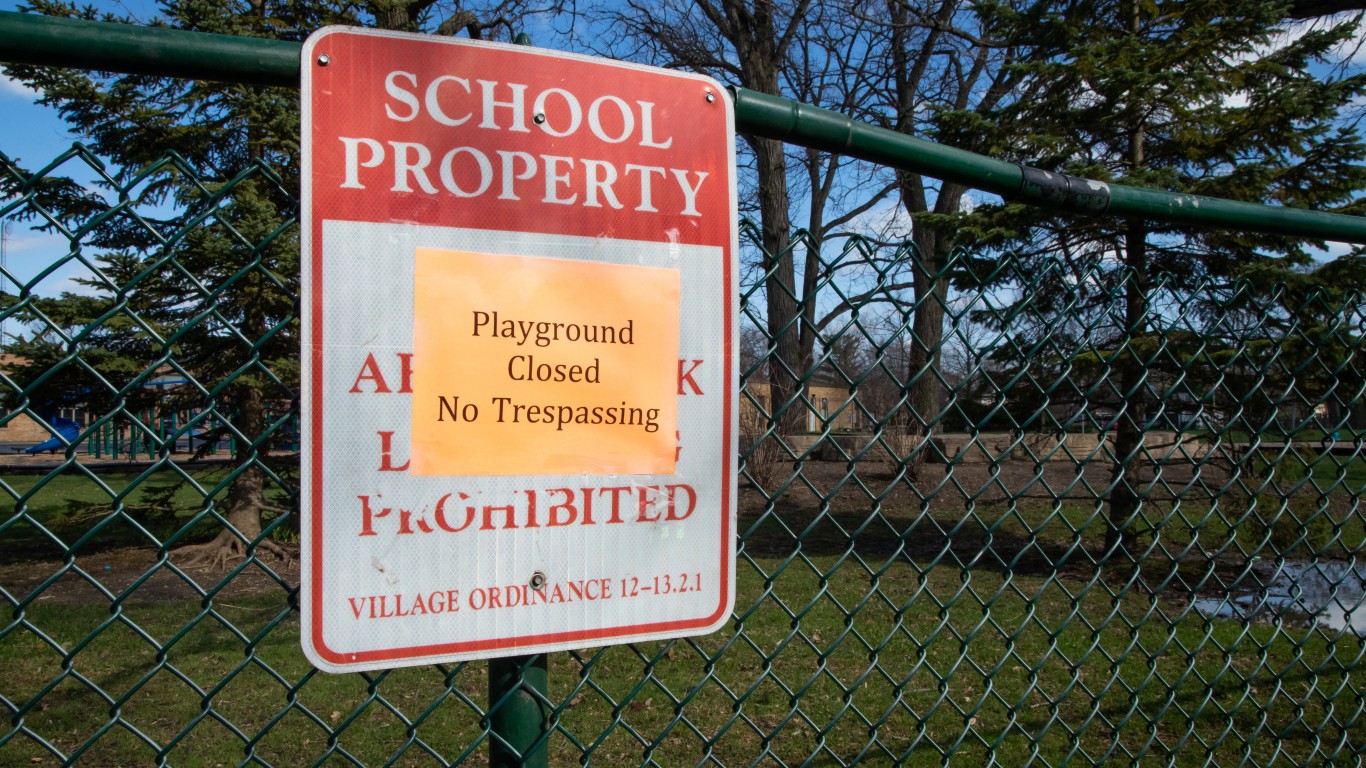
Illinois
> Measures taken: Chicago Public Schools returned to in-person learning on Jan 11, but high school students continue remote. Catholic schools now have the option to transition to remote learning.
> Health screening recommendations: Daily symptom screenings and temperature checks for all
> COVID-19 cases as of Jan 26: 8,700 per 100,000 people — 19th highest (total: 1,108,430)
> Change avg. daily cases, Jan 18 – Jan 25: 3.0% — 14th smallest increase (from 1,072,214 to 1,104,763)
> Population: 12.7 million
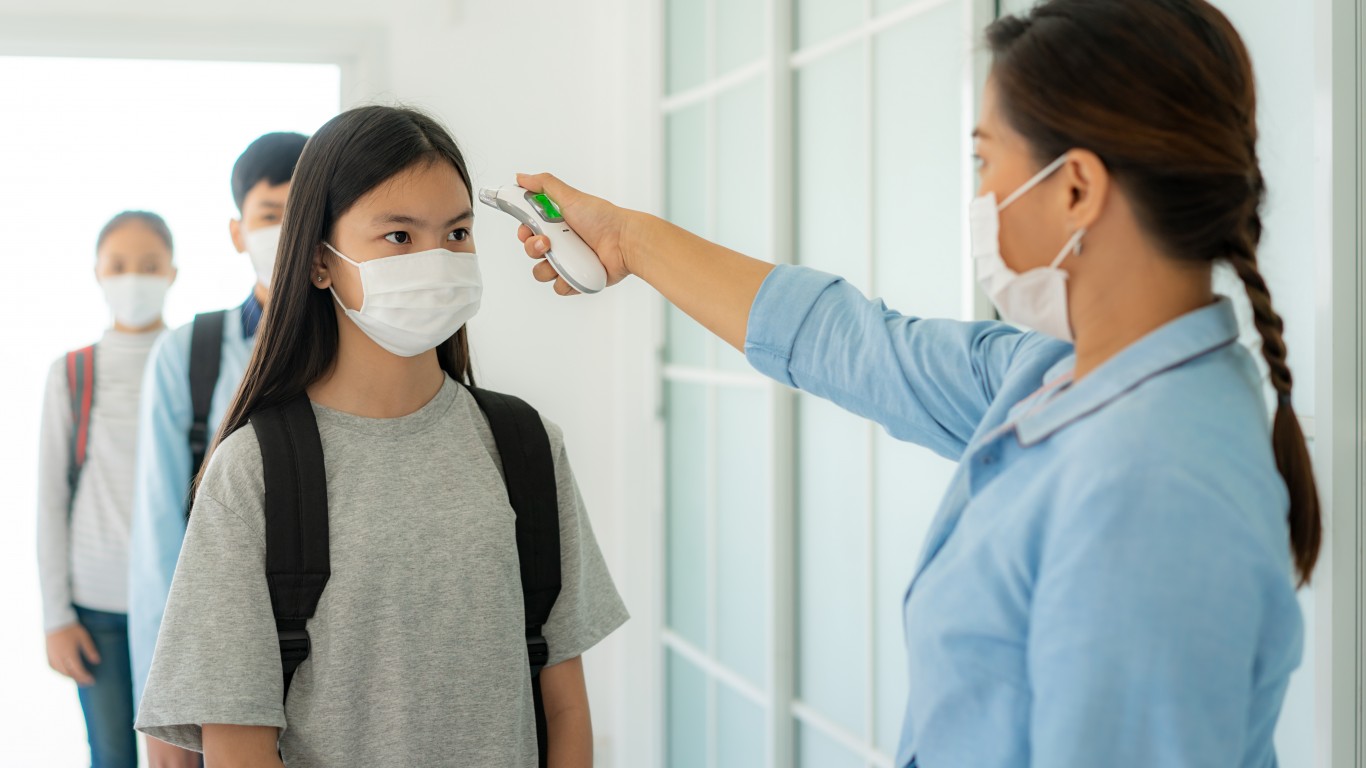
Indiana
> Measures taken: Half of school districts have moved to full-time virtual learning for various periods of time. Pre-K through 3rd grade students in Indianapolis returned to in-person learning full-time Jan 19. Students in higher grades did Jan 25.
> Health screening recommendations: Daily temperature checks
> COVID-19 cases as of Jan 26: 9,189 per 100,000 people — 11th highest (total: 614,946)
> Change avg. daily cases, Jan 18 – Jan 25: 3.5% — 19th smallest increase (from 592,709 to 613,228)
> Population: 6.7 million
[in-text-ad-2]
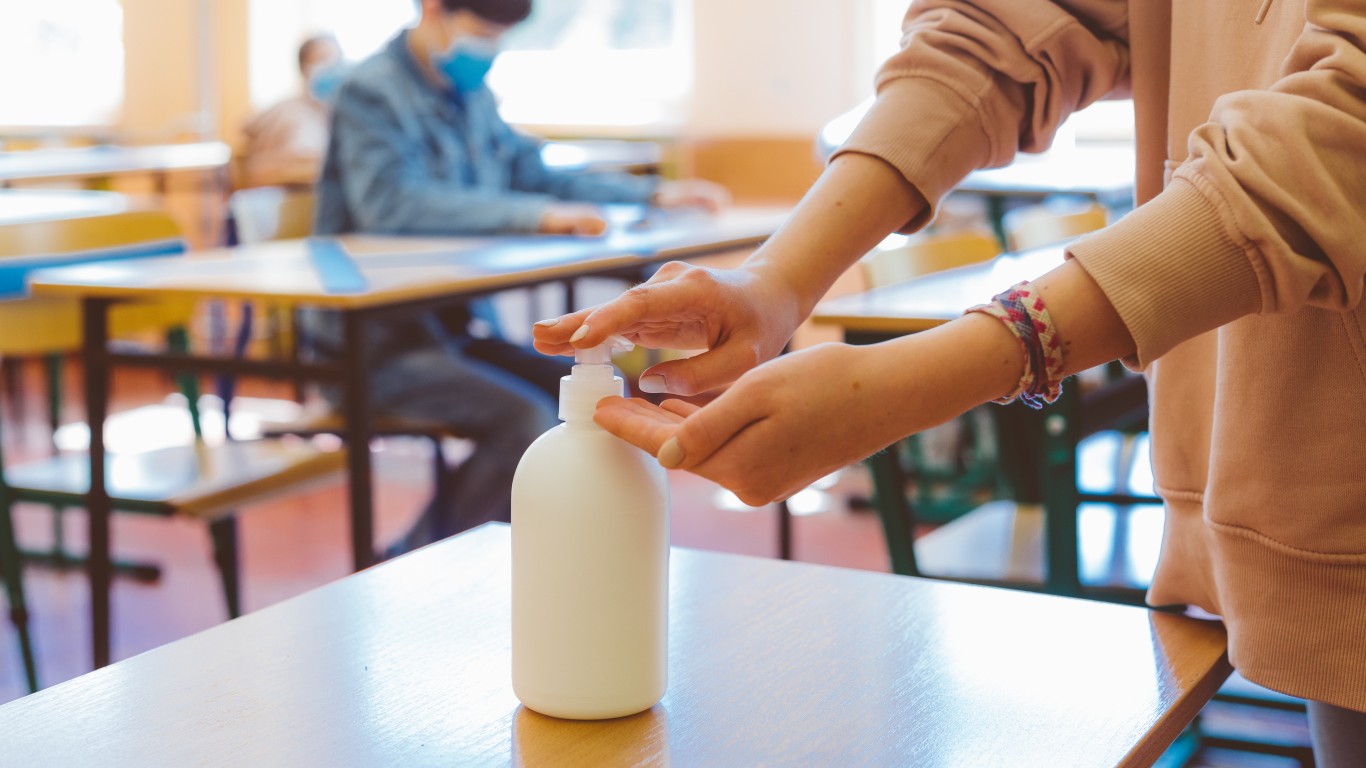
Iowa
> Measures taken: Dozens of counties have a 14-day rolling average positivity rate at or above 15%, which is the threshold that must be met before school districts can request to go to online-only learning.
> Health screening recommendations: Each school to come up with its own safety measures
> COVID-19 cases as of Jan 26: 9,951 per 100,000 people — 7th highest (total: 314,065)
> Change avg. daily cases, Jan 18 – Jan 25: 3.3% — 18th smallest increase (from 304,852 to 314,975)
> Population: 3.2 million
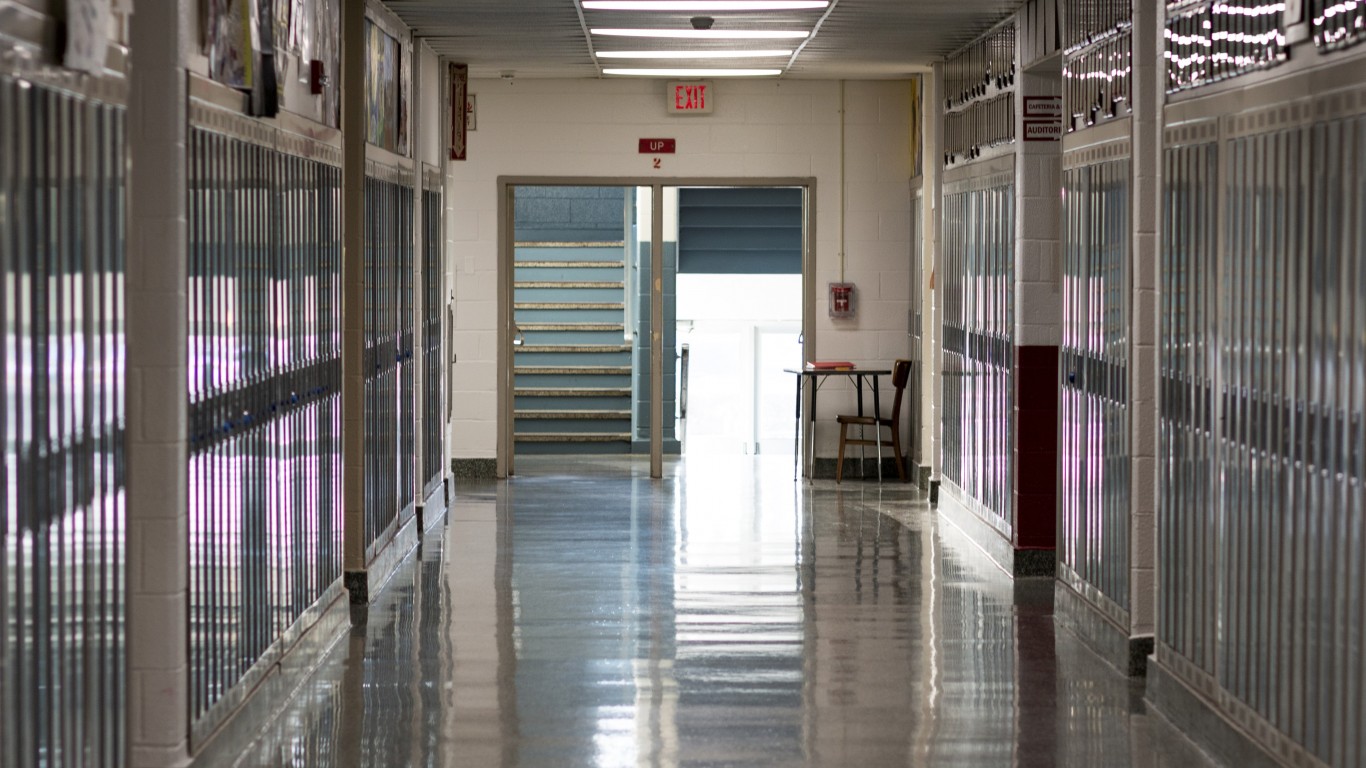
Kansas
> Measures taken: Schools in small and big towns have moved classes online full-time. Wichita school district staff accounts for more than half of COVID-19 cases in the district since the start of the school year.
> Health screening recommendations: Daily temperature checks for staff
> COVID-19 cases as of Jan 26: 9,159 per 100,000 people — 13th highest (total: 266,653)
> Change avg. daily cases, Jan 18 – Jan 25: 2.6% — 8th smallest increase (from 259,822 to 266,653)
> Population: 2.9 million
[in-text-ad]
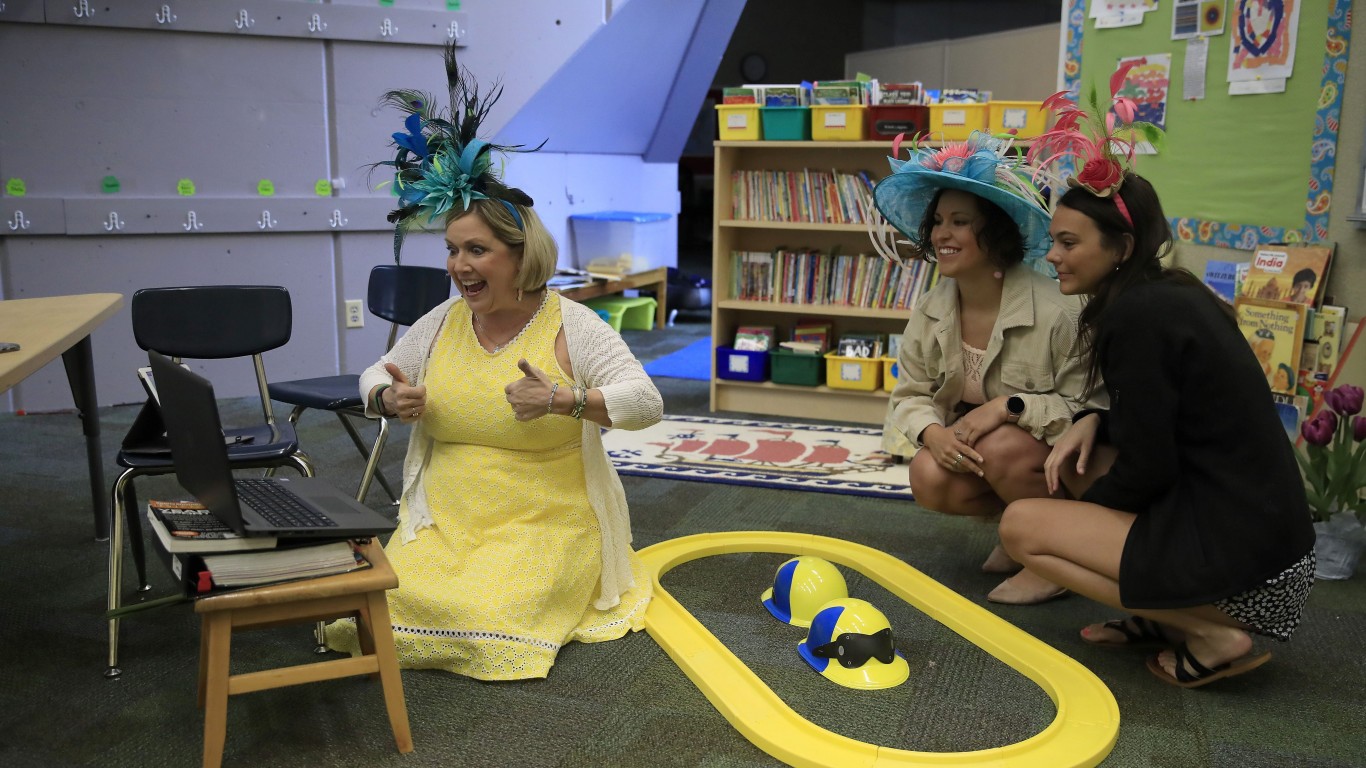
Kentucky
> Measures taken: Middle schools and high schools remained in remote learning until Jan. 4. Perry County moved to online learning, adding makeup days at the end of the academic year.
> Health screening recommendations: Daily temperature checks
> COVID-19 cases as of Jan 26: 7,784 per 100,000 people — 22nd lowest (total: 347,836)
> Change avg. daily cases, Jan 18 – Jan 25: 5.8% — 13th largest increase (from 328,668 to 347,836)
> Population: 4.5 million
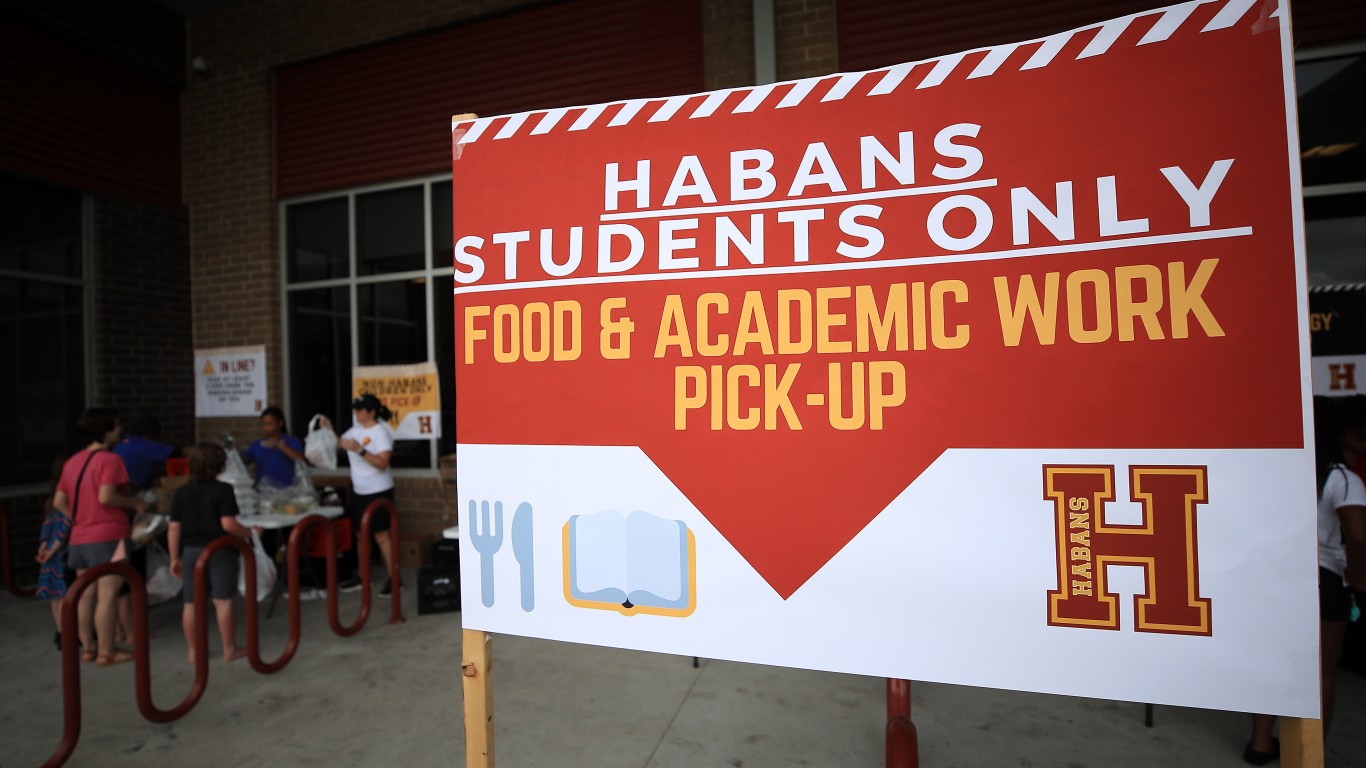
Louisiana
> Measures taken: High school students across the state do in-person COVID-19 testing. New Orleans public schools returned to in-person learning on Jan 4.
> Health screening recommendations: Daily symptom screening and temperature checks
> COVID-19 cases as of Jan 26: 8,338 per 100,000 people — 21st highest (total: 388,562)
> Change avg. daily cases, Jan 18 – Jan 25: 4.3% — 24th smallest increase (from 369,951 to 385,942)
> Population: 4.7 million
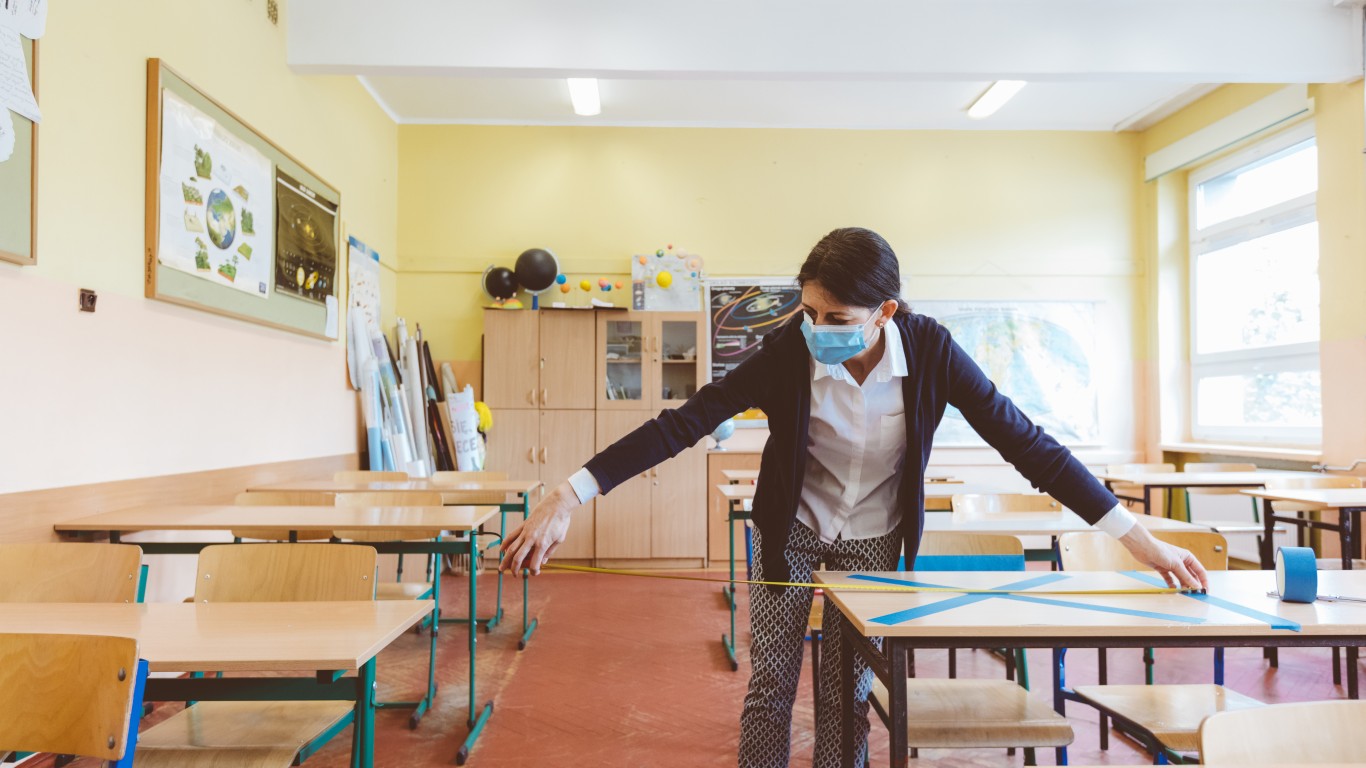
Maine
> Measures taken: Some schools are forced to go fully remote due to staffing shortages. Four counties are in the “yellow” category of transmission, and are advised to suspend extracurricular activities
> Health screening recommendations: Daily self-checks for students and staff
> COVID-19 cases as of Jan 26: 2,817 per 100,000 people — 3rd lowest (total: 37,708)
> Change avg. daily cases, Jan 18 – Jan 25: 9.4% — the largest increase (from 33,876 to 37,046)
> Population: 1.3 million
[in-text-ad-2]
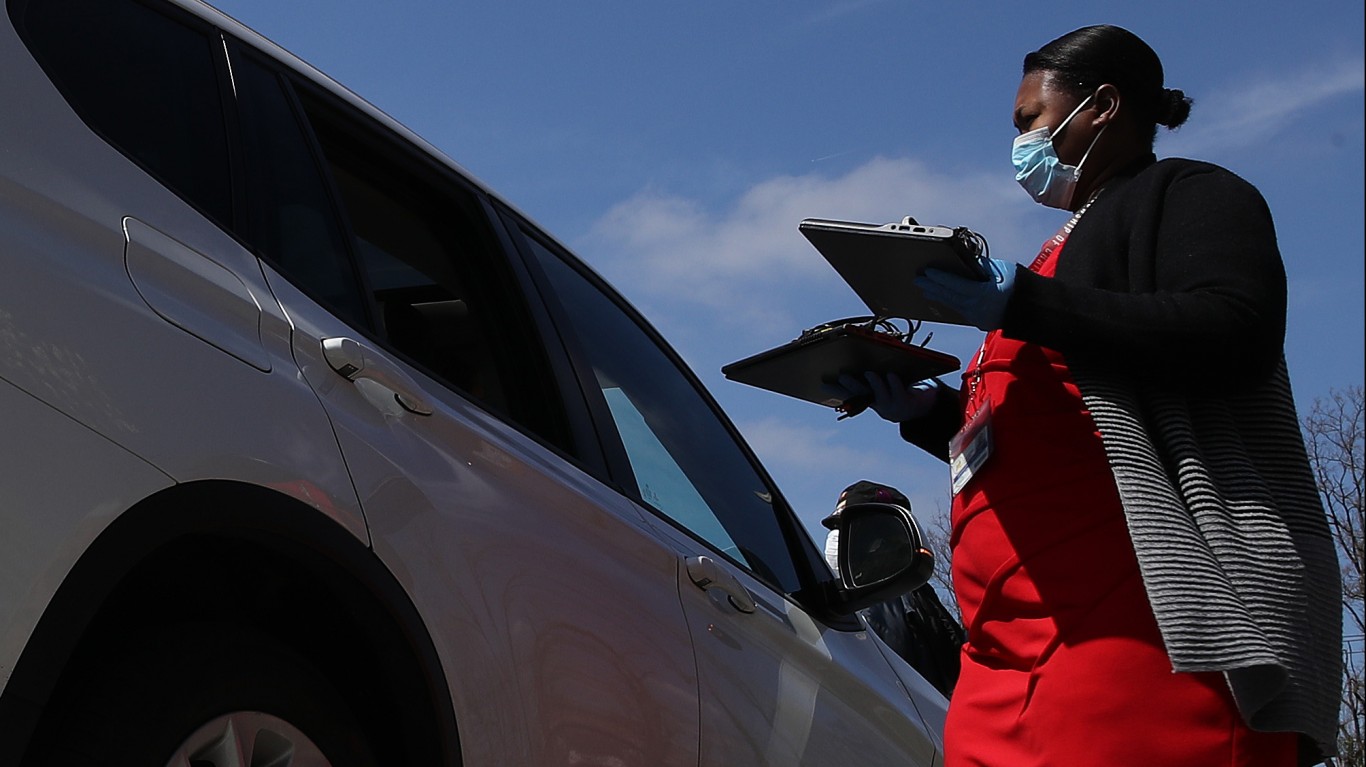
Maryland
> Measures taken: Many schools districts are canceling plans to move to in-person instruction any time soon. Somerset County Public Schools delayed in-person learning a week, until Jan 25.
> Health screening recommendations: Daily temperature checks for staff
> COVID-19 cases as of Jan 26: 5,703 per 100,000 people — 8th lowest (total: 344,620)
> Change avg. daily cases, Jan 18 – Jan 25: 4.5% — 23rd largest increase (from 328,214 to 343,138)
> Population: 6.0 million
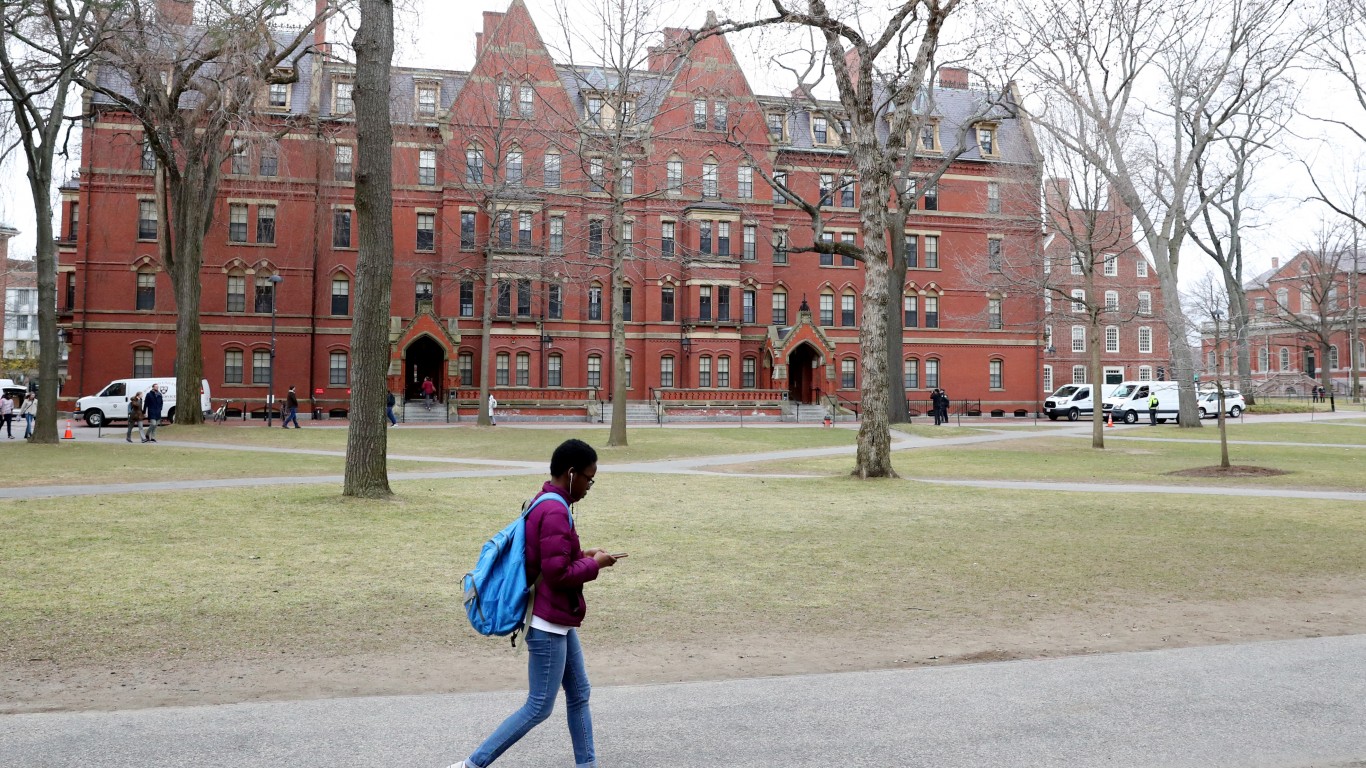
Massachusetts
> Measures taken: Some schools close again after community spread in the building. The state started a free rapid COVID-19 testing program. Teachers will be eligible for vaccinations next week.
> Health screening recommendations: Monitoring for symptoms, but temperature checks are not recommended
> COVID-19 cases as of Jan 26: 7,298 per 100,000 people — 18th lowest (total: 503,688)
> Change avg. daily cases, Jan 18 – Jan 25: 6.4% — 10th largest increase (from 473,441 to 503,688)
> Population: 6.9 million
[in-text-ad]
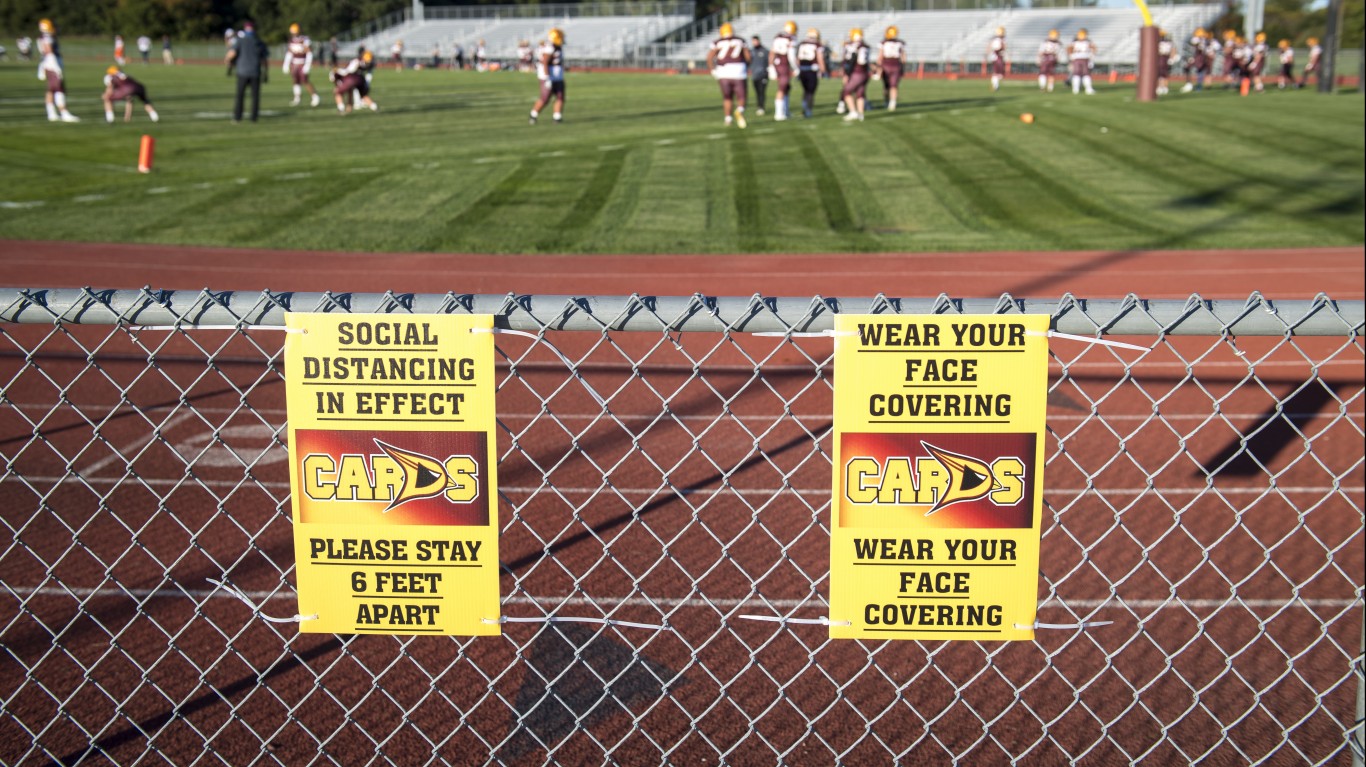
Michigan
> Measures taken: High schools were allowed to resume in-person learning on Jan 4. Vaccination of school staff started Jan. 11. The goal is to open all public schools for in-person instruction by March 1.
> Health screening recommendations: Daily temperature checks
> COVID-19 cases as of Jan 26: 6,024 per 100,000 people — 9th lowest (total: 602,168)
> Change avg. daily cases, Jan 18 – Jan 25: 2.6% — 7th smallest increase (from 585,128 to 600,093)
> Population: 10.0 million
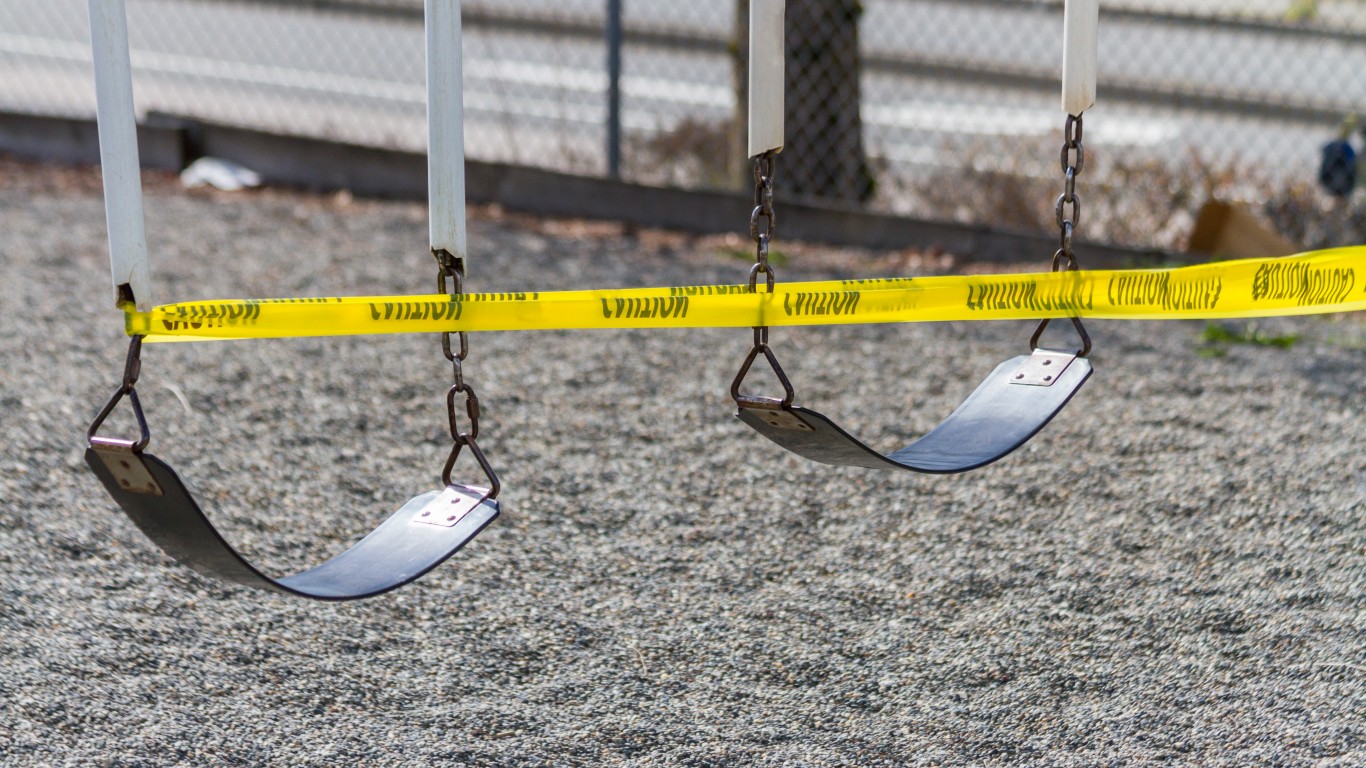
Minnesota
> Measures taken: Most of the state’s largest school districts are in distance learning for middle and high school students. Elementary schools reopened Jan 18.
> Health screening recommendations: Daily symptom screening and temperature checks
> COVID-19 cases as of Jan 26: 8,135 per 100,000 people — 23rd highest (total: 456,490)
> Change avg. daily cases, Jan 18 – Jan 25: 1.9% — 3rd smallest increase (from 447,349 to 455,783)
> Population: 5.6 million
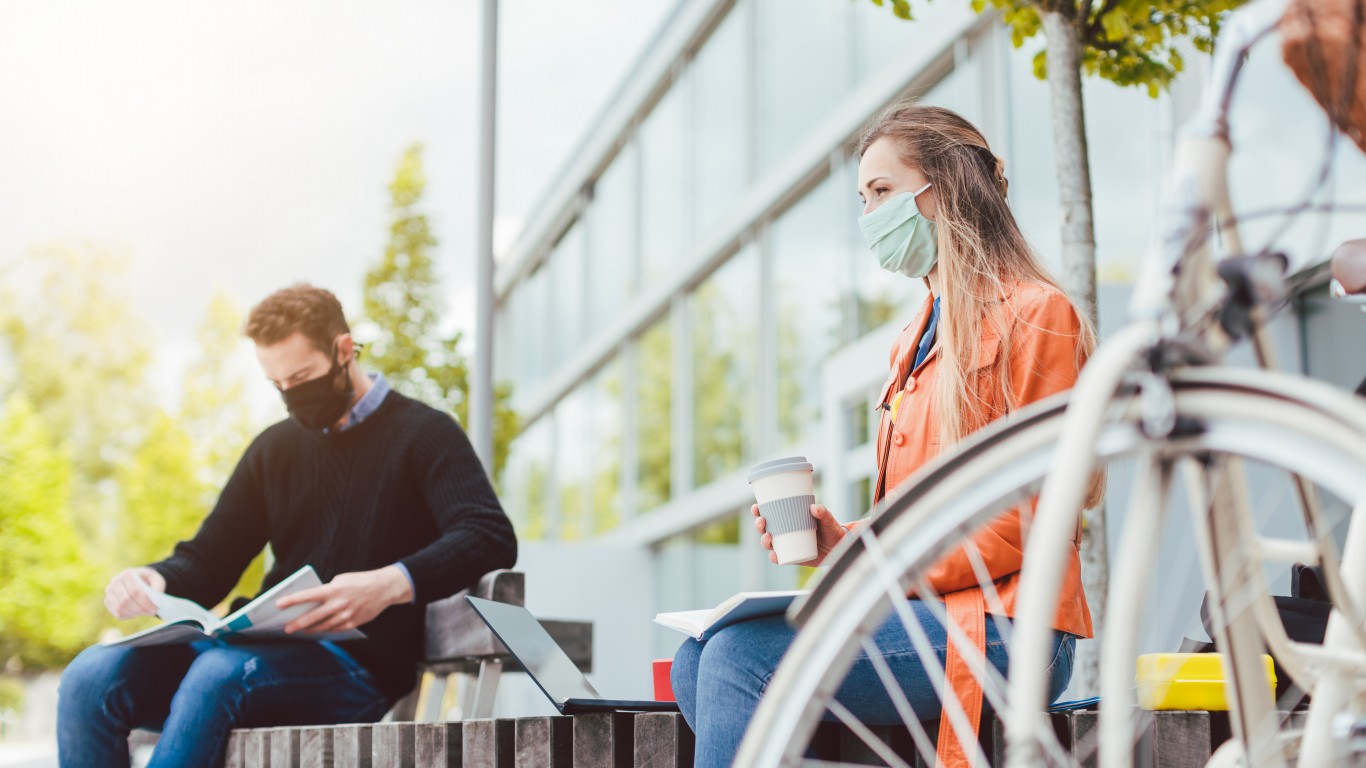
Mississippi
> Measures taken: Of the 781 schools in 77 counties across the state reporting COVID-19 cases, there have been a total of 14 new outbreaks in the week of Jan 11-15 with more than 10,000 students being quarantined. There have been 77 outbreaks in schools in January 2021 alo
> Health screening recommendations: Daily symptom screening and temperature checks
> COVID-19 cases as of Jan 26: 8,927 per 100,000 people — 17th highest (total: 266,598)
> Change avg. daily cases, Jan 18 – Jan 25: 4.4% — 25th smallest increase (from 253,932 to 265,146)
> Population: 3.0 million
[in-text-ad-2]
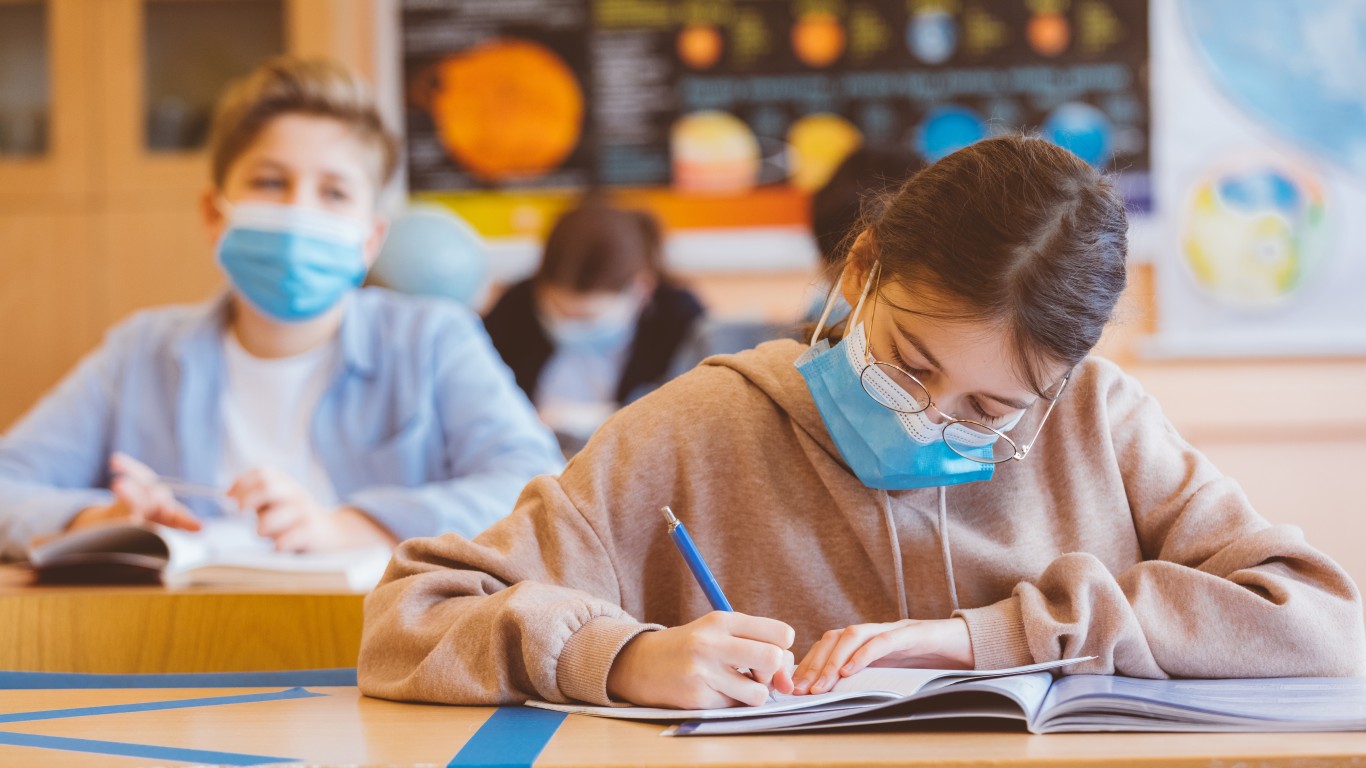
Missouri
> Measures taken: New mandates say that if people wear masks correctly and show no symptoms, they don’t have to quarantine for 14 days if exposed.
> Health screening recommendations: Daily symptom screening
> COVID-19 cases as of Jan 26: 7,370 per 100,000 people — 19th lowest (total: 451,493)
> Change avg. daily cases, Jan 18 – Jan 25: 2.6% — 9th smallest increase (from 438,840 to 450,414)
> Population: 6.1 million
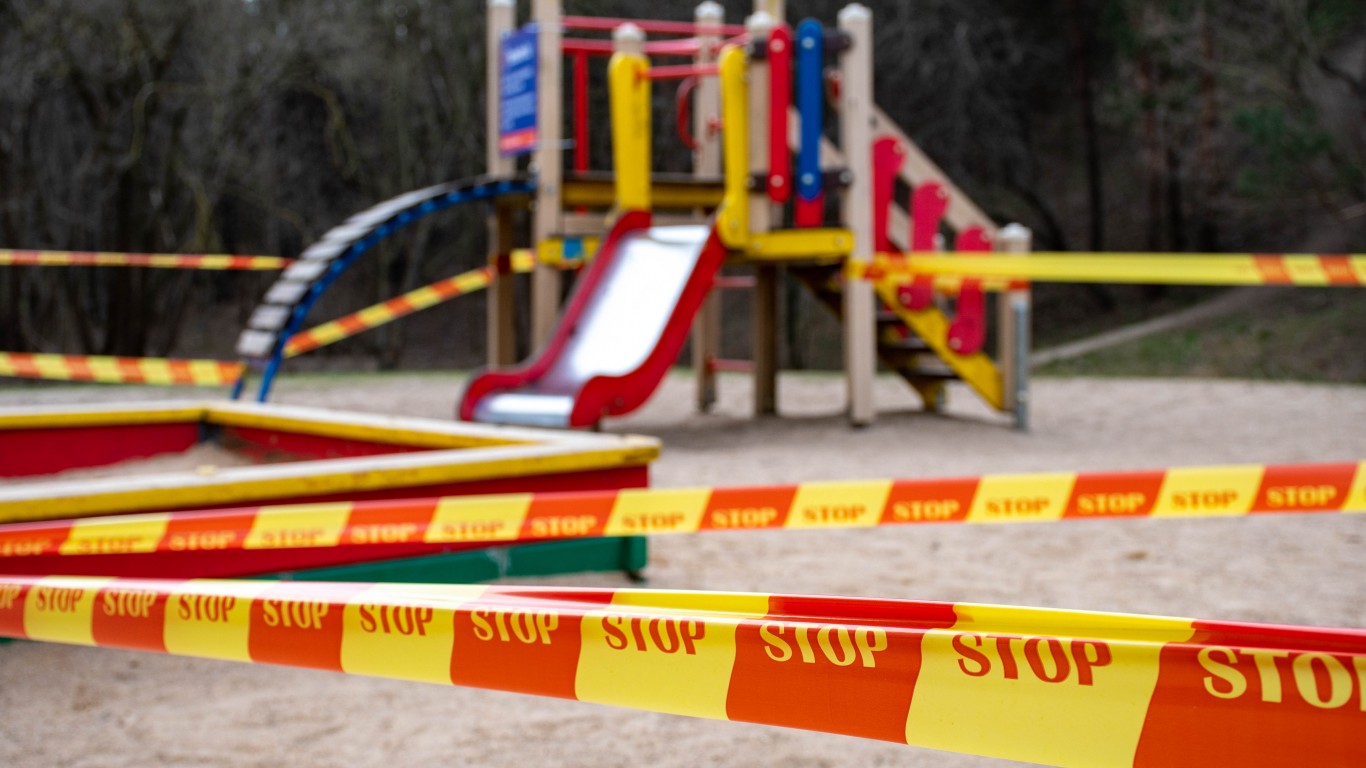
Montana
> Measures taken: More parents pull out their children from schools and sign them up for homeschooling. The official homeschool headcount in Oct 2020 was more than double what it was in Oct 2019.
> Health screening recommendations: Temperature checks for visitors
> COVID-19 cases as of Jan 26: 8,675 per 100,000 people — 20th highest (total: 92,160)
> Change avg. daily cases, Jan 18 – Jan 25: 2.5% — 5th smallest increase (from 89,576 to 91,816)
> Population: 1.1 million
[in-text-ad]
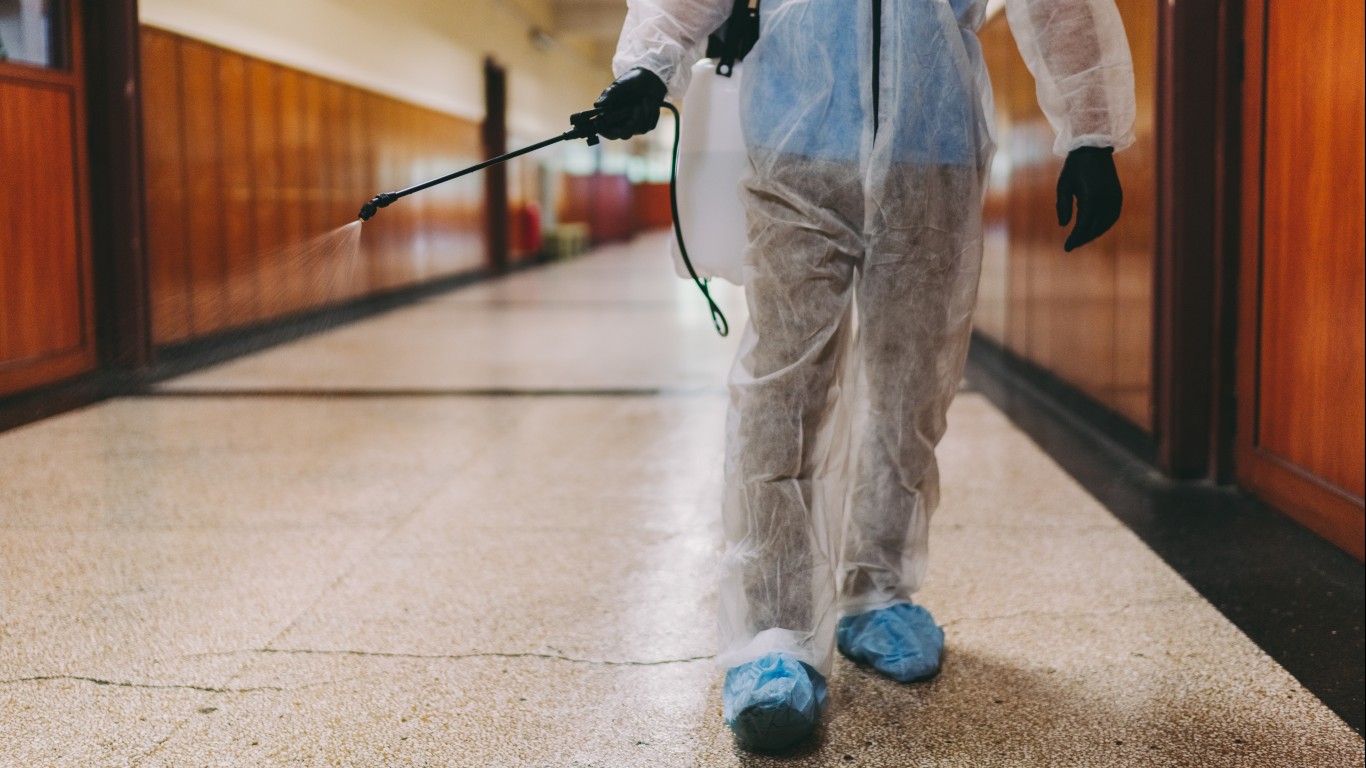
Nebraska
> Measures taken: Teachers unions want more restrictions amid a new surge of cases. Nebraska teachers were supposed to be able to receive the COVID vaccine in January or early February, but the start of that phase has been delayed.
> Health screening recommendations: For visitors to wash hands before entering the school as well as students self-screen for symptoms
> COVID-19 cases as of Jan 26: 9,734 per 100,000 people — 8th highest (total: 187,793)
> Change avg. daily cases, Jan 18 – Jan 25: 2.8% — 11th smallest increase (from 181,978 to 187,147)
> Population: 1.9 million
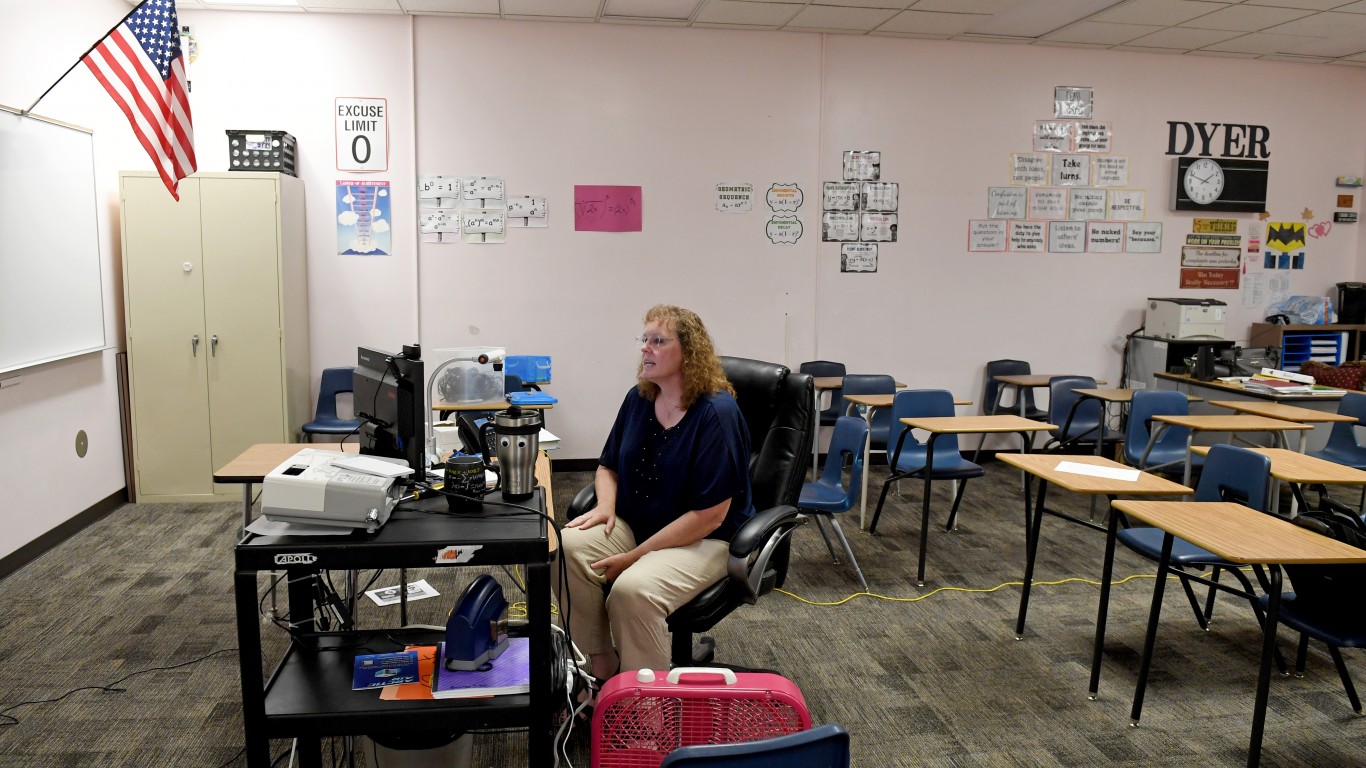
Nevada
> Measures taken: Schools started testing symptomatic students and staff with an antigen test. Some districts have been allowed to bypass regulations to hire substitute teachers.
> Health screening recommendations: Daily symptom screening and temperature checks as well as post signs about proper hand-washing and other ways to stop the virus
> COVID-19 cases as of Jan 26: 8,992 per 100,000 people — 16th highest (total: 272,853)
> Change avg. daily cases, Jan 18 – Jan 25: 3.5% — 20th smallest increase (from 262,794 to 271,897)
> Population: 3.0 million
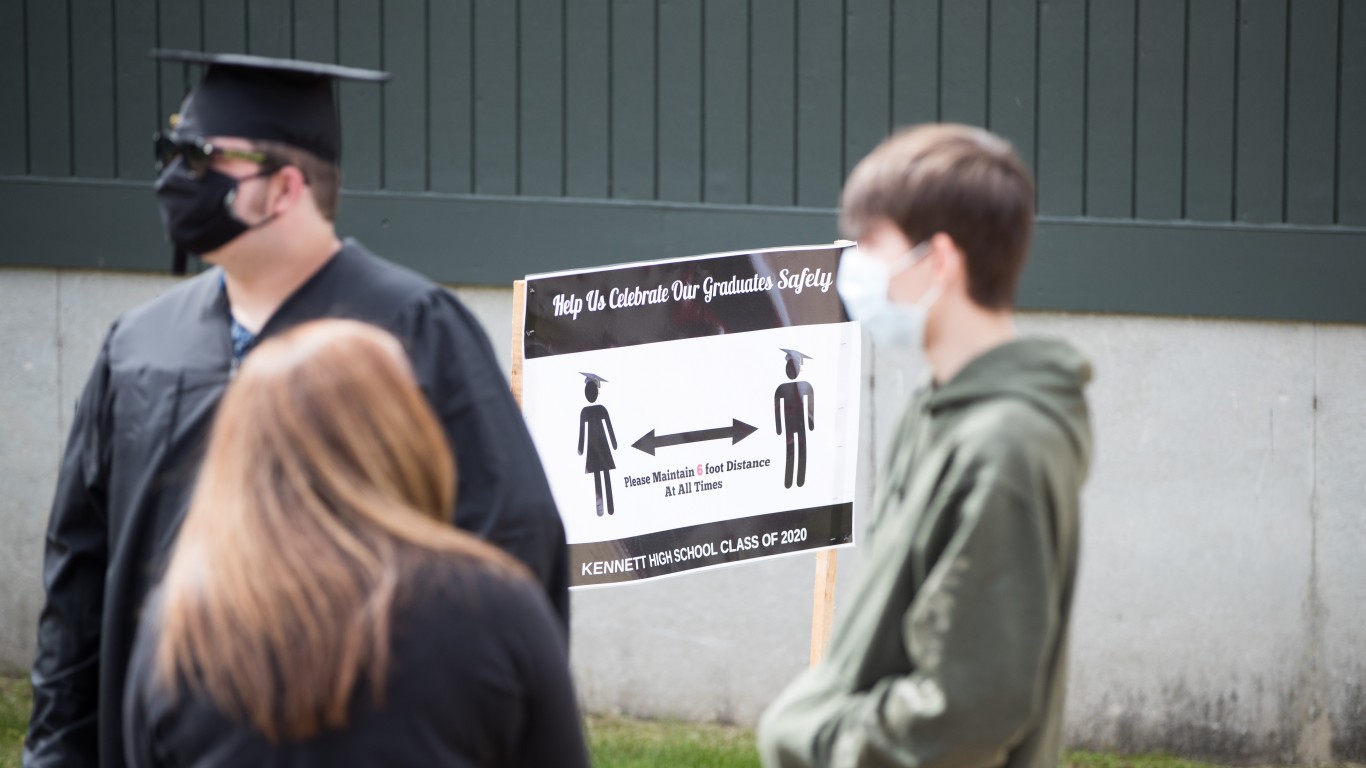
New Hampshire
> Measures taken: Some schools are forced to move online due to staffing shortages as teachers and staff have to quarantine.
> Health screening recommendations: Daily symptom screenings for staff and students
> COVID-19 cases as of Jan 26: 4,627 per 100,000 people — 6th lowest (total: 62,768)
> Change avg. daily cases, Jan 18 – Jan 25: 8.5% — 3rd largest increase (from 57,864 to 62,768)
> Population: 1.4 million
[in-text-ad-2]
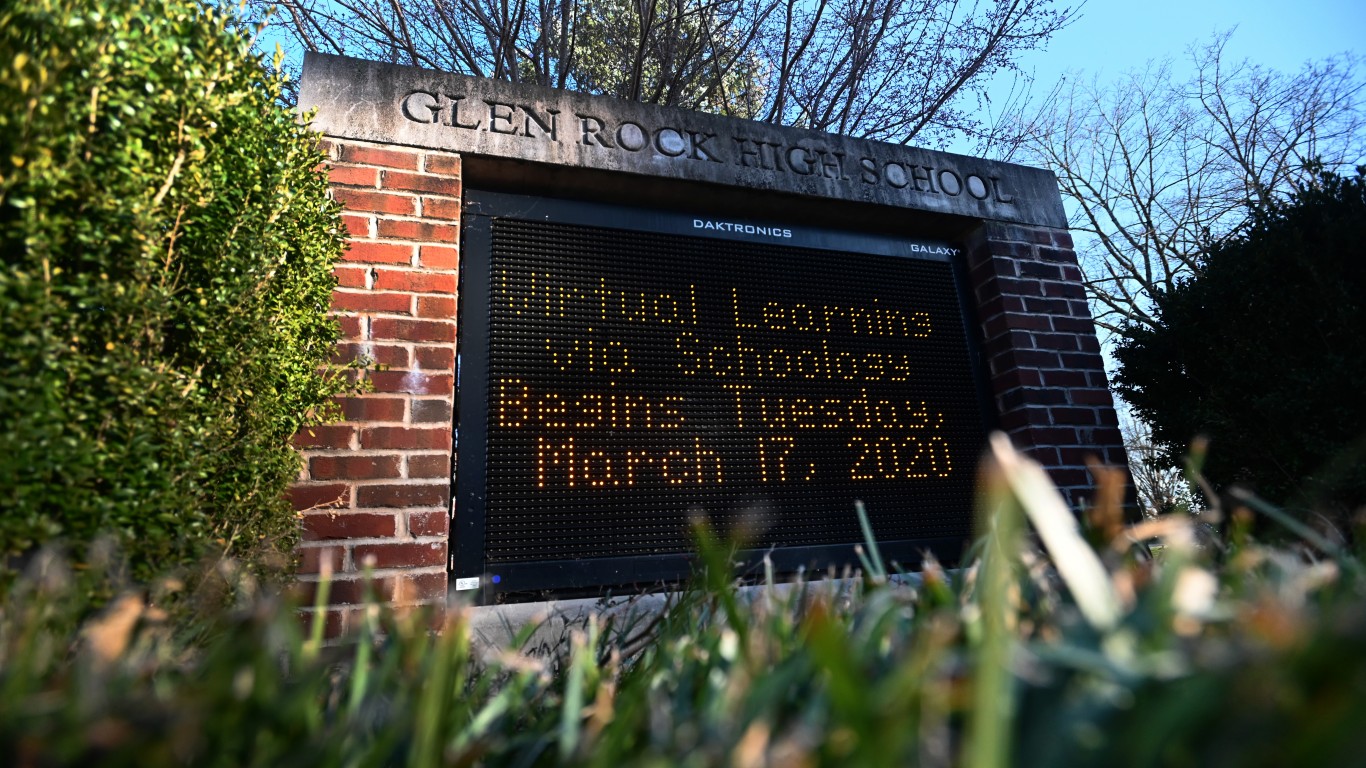
New Jersey
> Measures taken: 77 school districts started the school after the winter break with full in-person classes, 339 started remotely. 100+ outbreaks reported among students and staff since the start of the school year.
> Health screening recommendations: Daily symptom screening
> COVID-19 cases as of Jan 26: 7,540 per 100,000 people — 21st lowest (total: 671,675)
> Change avg. daily cases, Jan 18 – Jan 25: 5.7% — 15th largest increase (from 631,020 to 666,902)
> Population: 8.9 million
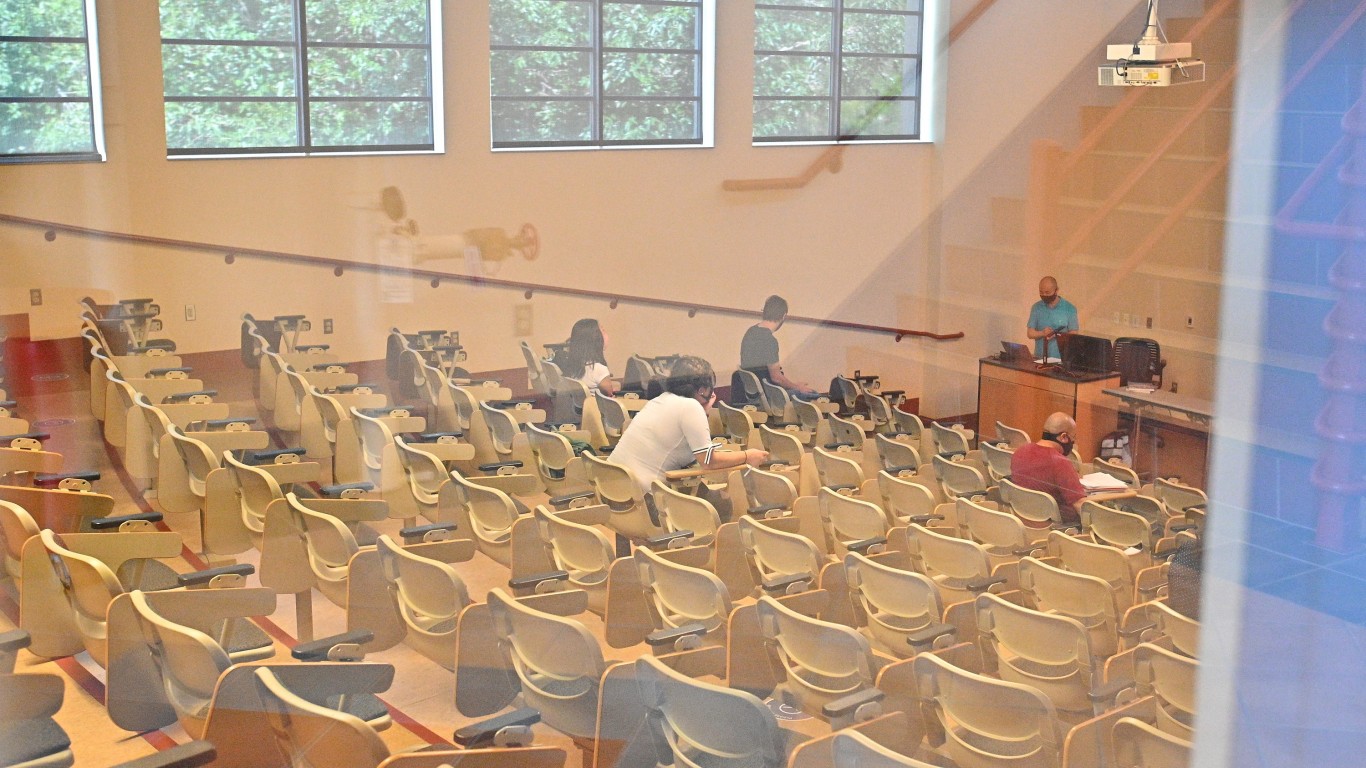
New Mexico
> Measures taken: Rio Rancho Public Schools moved to full-time online instruction until Jan 18. No in-person learning was allowed in the state during the weeks of Jan 4 – 11.
> Health screening recommendations: Daily temperature checks
> COVID-19 cases as of Jan 26: 8,098 per 100,000 people — 24th highest (total: 169,696)
> Change avg. daily cases, Jan 18 – Jan 25: 3.3% — 17th smallest increase (from 164,263 to 169,696)
> Population: 2.1 million
[in-text-ad]
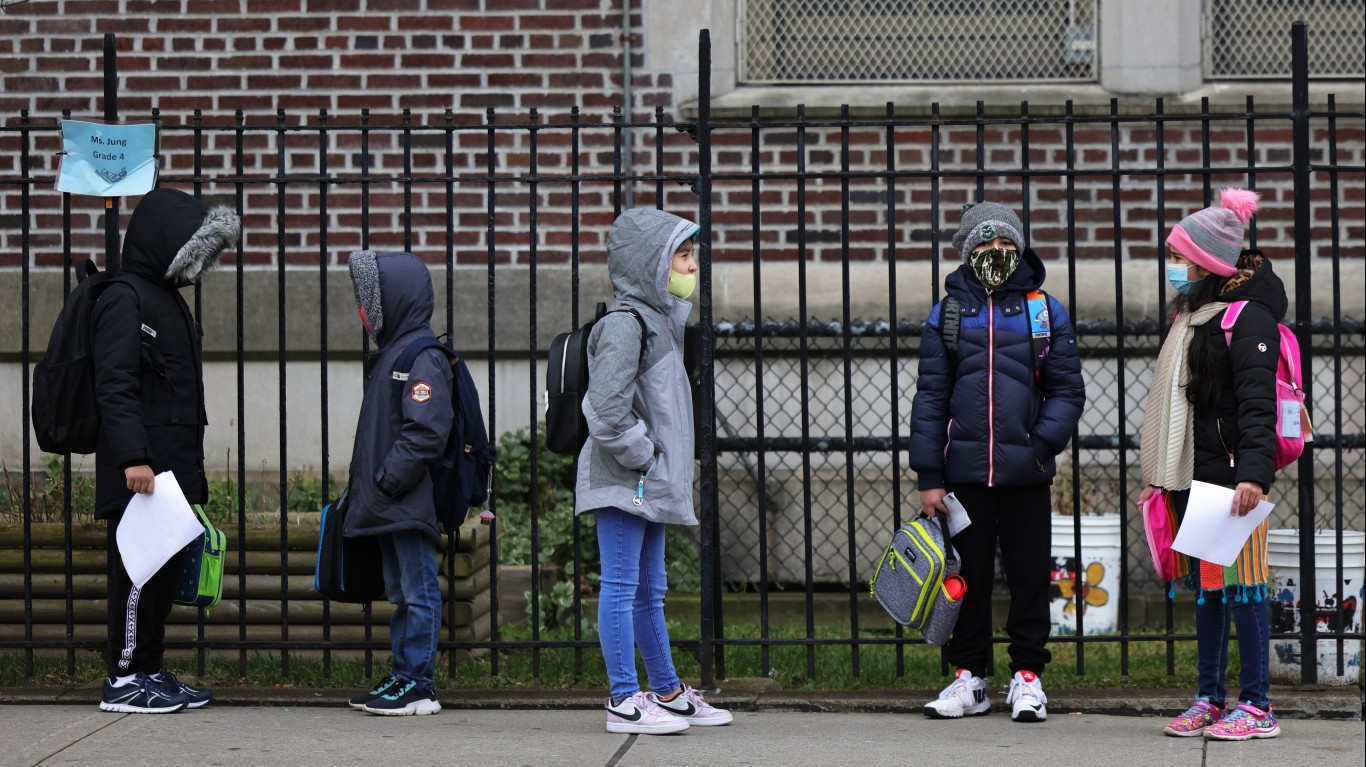
New York
> Measures taken: Elementary schools in NYC can open for students whose parents agree to weekly tests. Hundreds of schools are fully or partially closed. Closures were cut to 10 days, instead of 14, as per CDC guidelines.
> Health screening recommendations: Daily temperature checks for all
> COVID-19 cases as of Jan 26: 6,852 per 100,000 people — 14th lowest (total: 1,338,990)
> Change avg. daily cases, Jan 18 – Jan 25: 7.5% — 5th largest increase (from 1,245,575 to 1,338,990)
> Population: 19.5 million
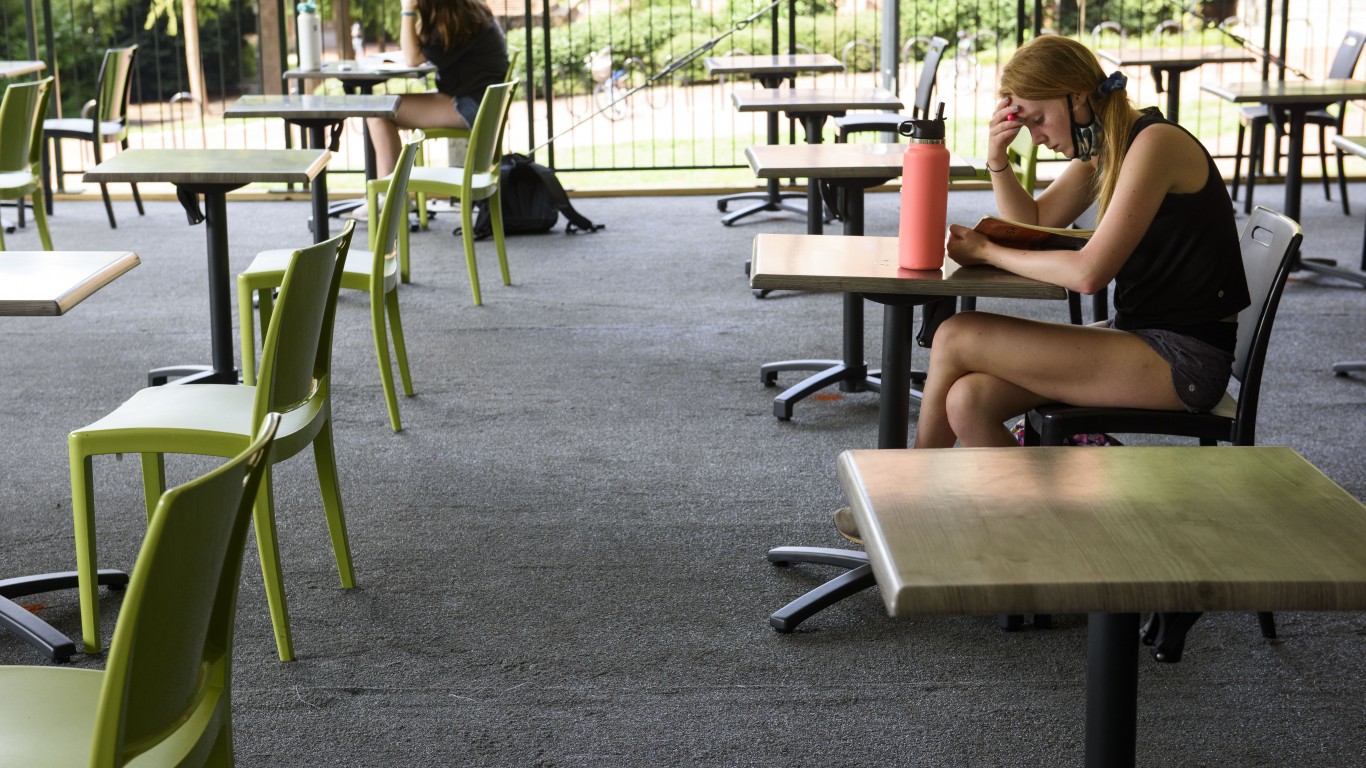
North Carolina
> Measures taken: The Johnston County school board voted 5-2 to suspend in-person classes. Charlotte-Mecklenburg Schools moved to online learning until Feb 12.
> Health screening recommendations: Daily temperature checks
> COVID-19 cases as of Jan 26: 7,005 per 100,000 people — 16th lowest (total: 727,423)
> Change avg. daily cases, Jan 18 – Jan 25: 7.2% — 6th largest increase (from 674,637 to 723,445)
> Population: 10.4 million
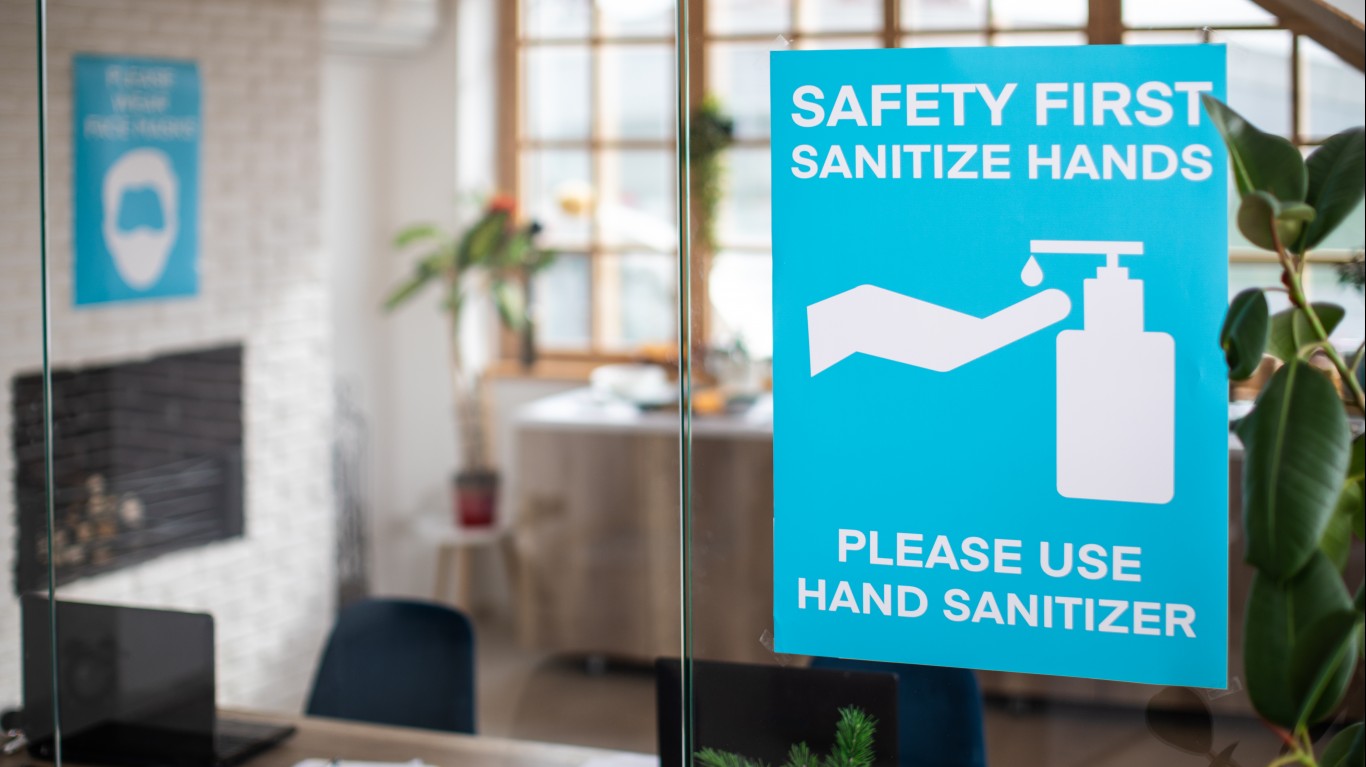
North Dakota
> Measures taken: The state started free rapid testing for K-12 teachers, staff and administrators.
> Health screening recommendations: testing for COVID-19 based on risk level
> COVID-19 cases as of Jan 26: 12,763 per 100,000 people — the highest (total: 97,006)
> Change avg. daily cases, Jan 18 – Jan 25: 1.0% — the smallest increase (from 95,934 to 96,874)
> Population: 760,000
[in-text-ad-2]
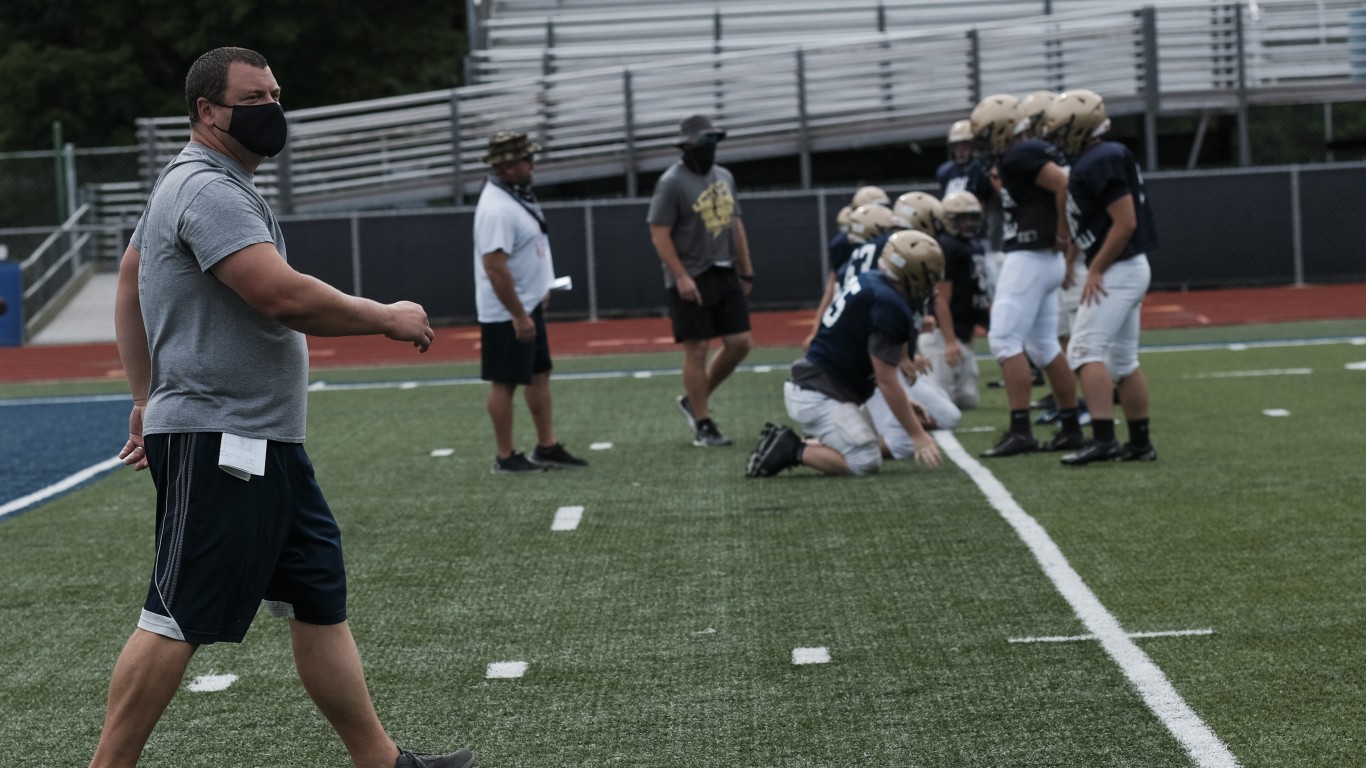
Ohio
> Measures taken: Ohio students who are exposed to COVID-19 are no longer asked to quarantine, if mask and distancing protocols are followed. Most Ohio schools plan to return to in-person learning by March 1. Efforts to vaccinate schools staff to start Feb 1.
> Health screening recommendations: Daily symptom screening
> COVID-19 cases as of Jan 26: 7,468 per 100,000 people — 20th lowest (total: 872,918)
> Change avg. daily cases, Jan 18 – Jan 25: 4.5% — 24th largest increase (from 831,066 to 868,656)
> Population: 11.7 million
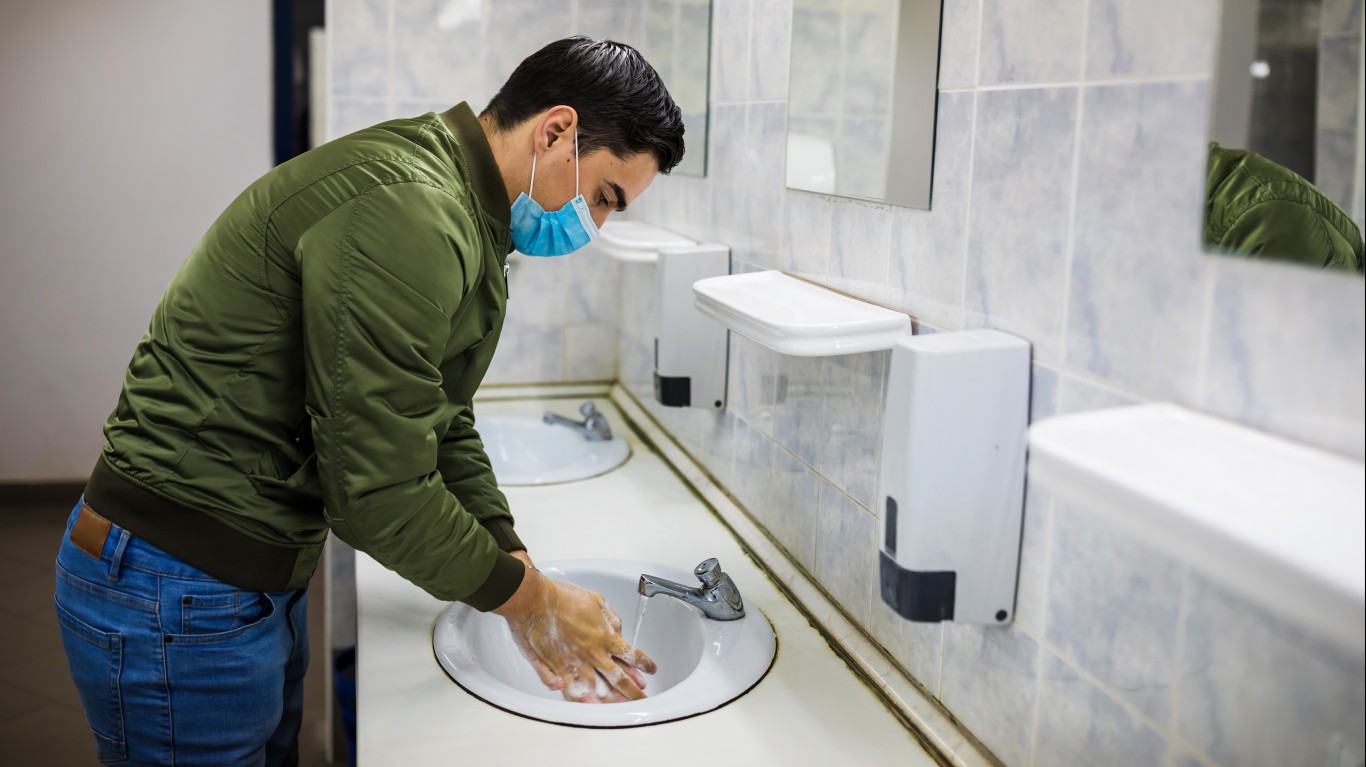
Oklahoma
> Measures taken: Teachers are now eligible to get the COVID-19 vaccine. Use of masks will be enforced. Unless students or staff are showing symptoms, they don’t have to quarantine.
> Health screening recommendations: Daily temperature checks at home
> COVID-19 cases as of Jan 26: 9,546 per 100,000 people — 9th highest (total: 376,424)
> Change avg. daily cases, Jan 18 – Jan 25: 5.1% — 19th largest increase (from 356,816 to 374,853)
> Population: 3.9 million
[in-text-ad]

Oregon
> Measures taken: Schools are advised to reopen for elementary on-site and hybrid transition when there are 350 COVID-19 cases per 100,000 in a county, up from 200 or below.
> Health screening recommendations: Daily symptom screening and temperature checks
> COVID-19 cases as of Jan 26: 3,307 per 100,000 people — 4th lowest (total: 138,587)
> Change avg. daily cases, Jan 18 – Jan 25: 3.5% — 21st smallest increase (from 133,851 to 138,587)
> Population: 4.2 million
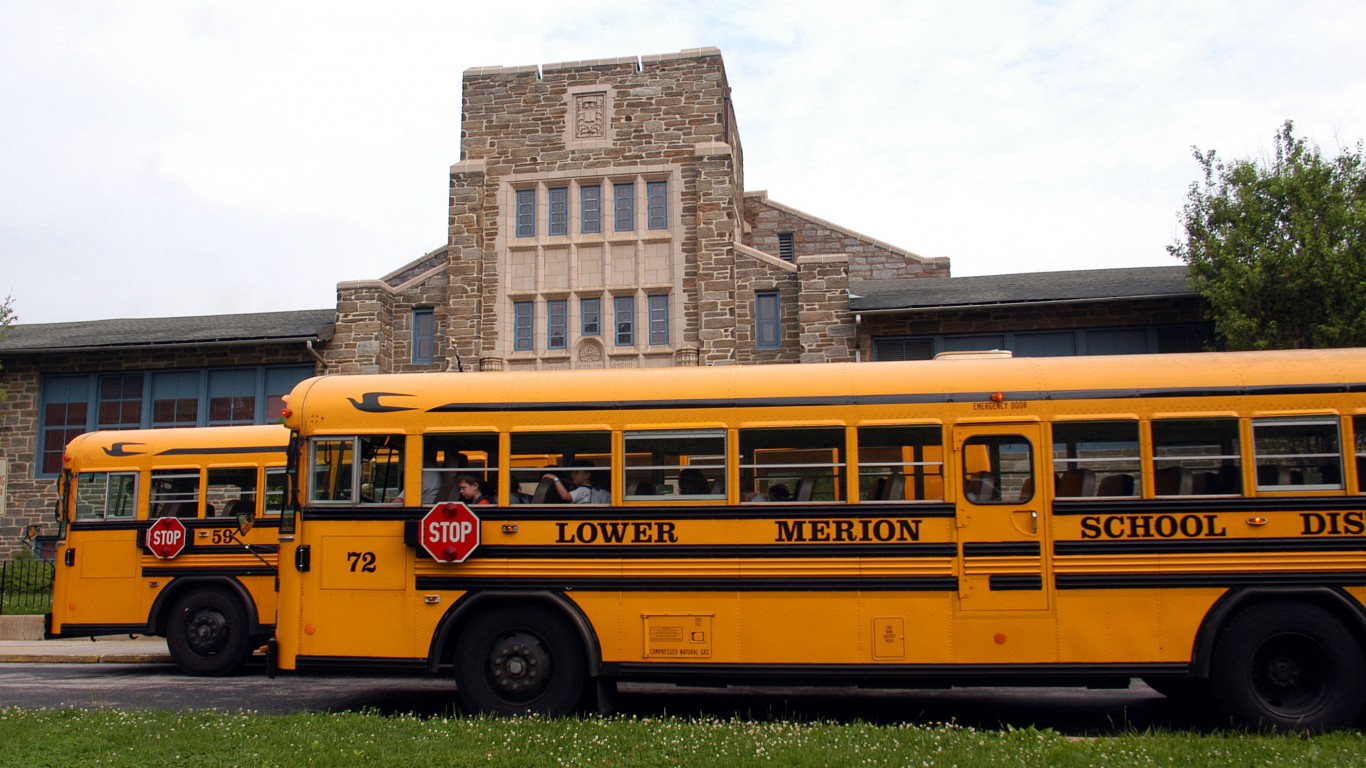
Pennsylvania
> Measures taken: Schools must close if they reach a certain number of COVID-19 cases. Nearly all districts have submitted forms attesting that they are following safety protocols, a requirement to stay open.
> Health screening recommendations: Daily symptom screening
> COVID-19 cases as of Jan 26: 6,344 per 100,000 people — 10th lowest (total: 812,495)
> Change avg. daily cases, Jan 18 – Jan 25: 4.7% — 21st largest increase (from 771,845 to 807,867)
> Population: 12.8 million
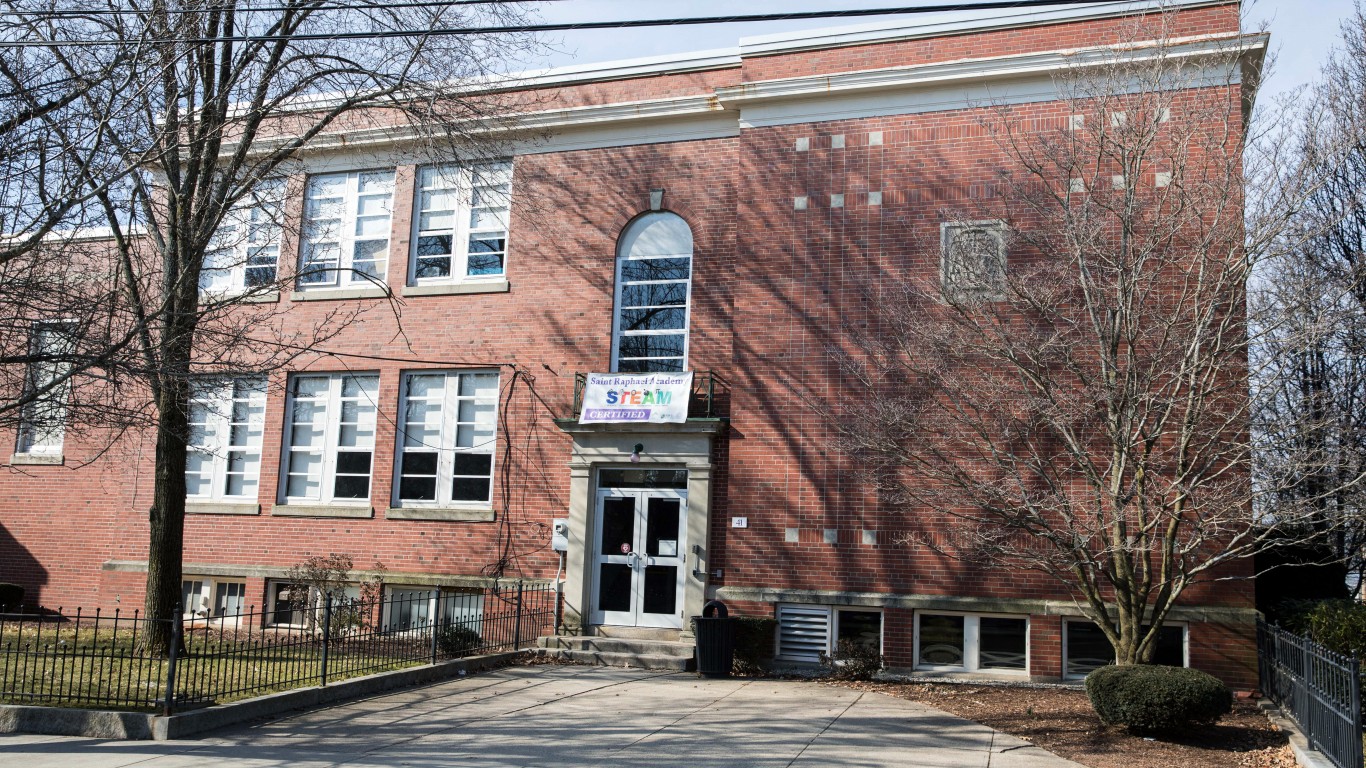
Rhode Island
> Measures taken: Public school districts reopened on a staggered schedule from Jan 7 – Jan 15. All sports were cancelled until January.
> Health screening recommendations: At-home or on-site symptom screening as well as temperature checks
> COVID-19 cases as of Jan 26: 10,630 per 100,000 people — 4th highest (total: 112,396)
> Change avg. daily cases, Jan 18 – Jan 25: 7.0% — 9th largest increase (from 104,443 to 111,754)
> Population: 1.1 million
[in-text-ad-2]
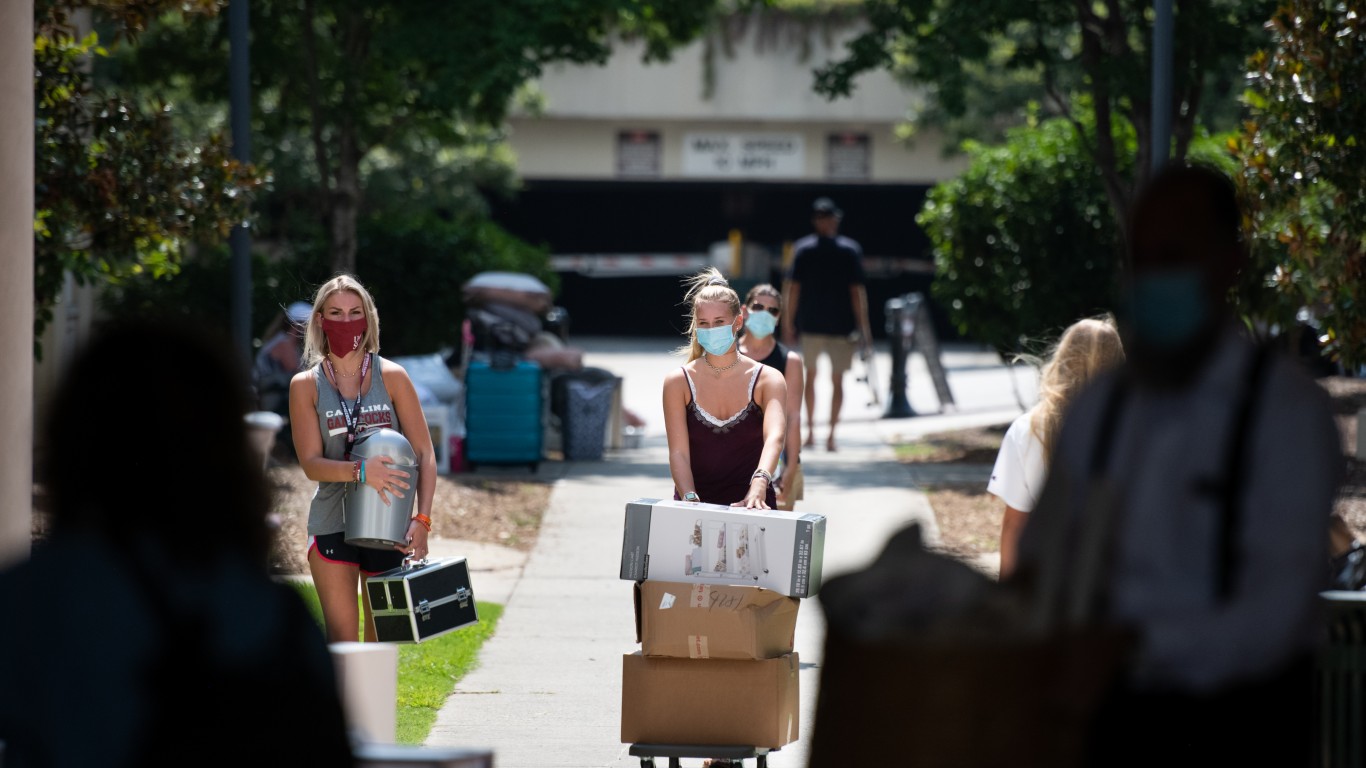
South Carolina
> Measures taken: Public schools across the state started testing for COVID-19 for free in an attempt to help keep classrooms open.
> Health screening recommendations: Each school to come up with its own safety measures
> COVID-19 cases as of Jan 26: 8,333 per 100,000 people — 22nd highest (total: 423,667)
> Change avg. daily cases, Jan 18 – Jan 25: 7.7% — 4th largest increase (from 391,464 to 421,417)
> Population: 5.1 million
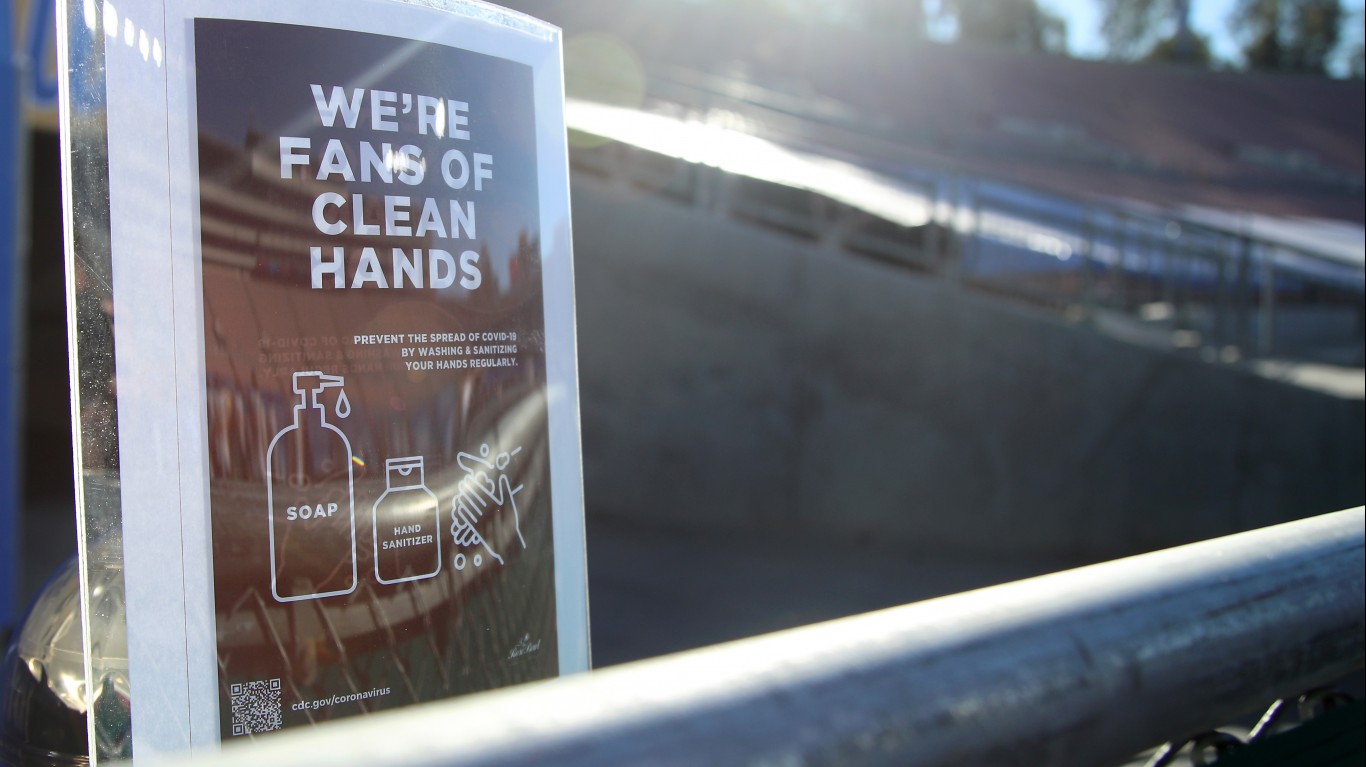
South Dakota
> Measures taken: South Dakota’s positivity rate is around 42%, suggesting testing is still very limited. Many school districts have implemented mask mandates.
> Health screening recommendations: Daily symptom screening and temperature checks
> COVID-19 cases as of Jan 26: 10,884 per 100,000 people — 2nd highest (total: 96,021)
> Change avg. daily cases, Jan 18 – Jan 25: 1.3% — 2nd smallest increase (from 94,652 to 95,865)
> Population: 882,000
[in-text-ad]

Tennessee
> Measures taken: Many schools in the state started the spring semester fully remote for at least the first 2 weeks.
> Health screening recommendations: Daily symptom screening and temperature checks
> COVID-19 cases as of Jan 26: 10,494 per 100,000 people — 5th highest (total: 710,427)
> Change avg. daily cases, Jan 18 – Jan 25: 3.3% — 16th smallest increase (from 687,751 to 710,427)
> Population: 6.8 million
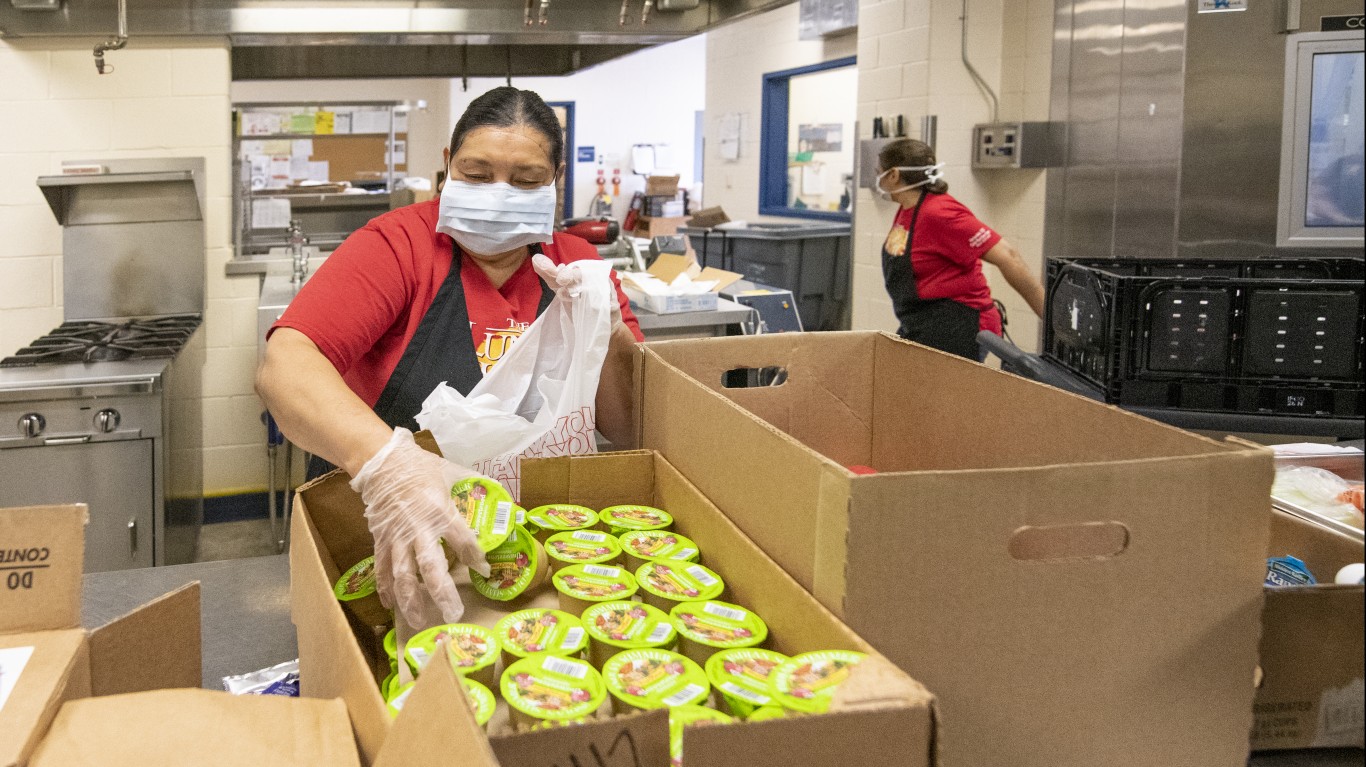
Texas
> Measures taken: New schools can’t opt-in to the K-12 COVID Testing Project to receive rapid tests. Those already in will continue to receive them.
> Health screening recommendations: Symptom self-screening for staff
> COVID-19 cases as of Jan 26: 7,828 per 100,000 people — 24th lowest (total: 2,246,845)
> Change avg. daily cases, Jan 18 – Jan 25: 5.7% — 14th largest increase (from 2,125,552 to 2,246,845)
> Population: 28.7 million
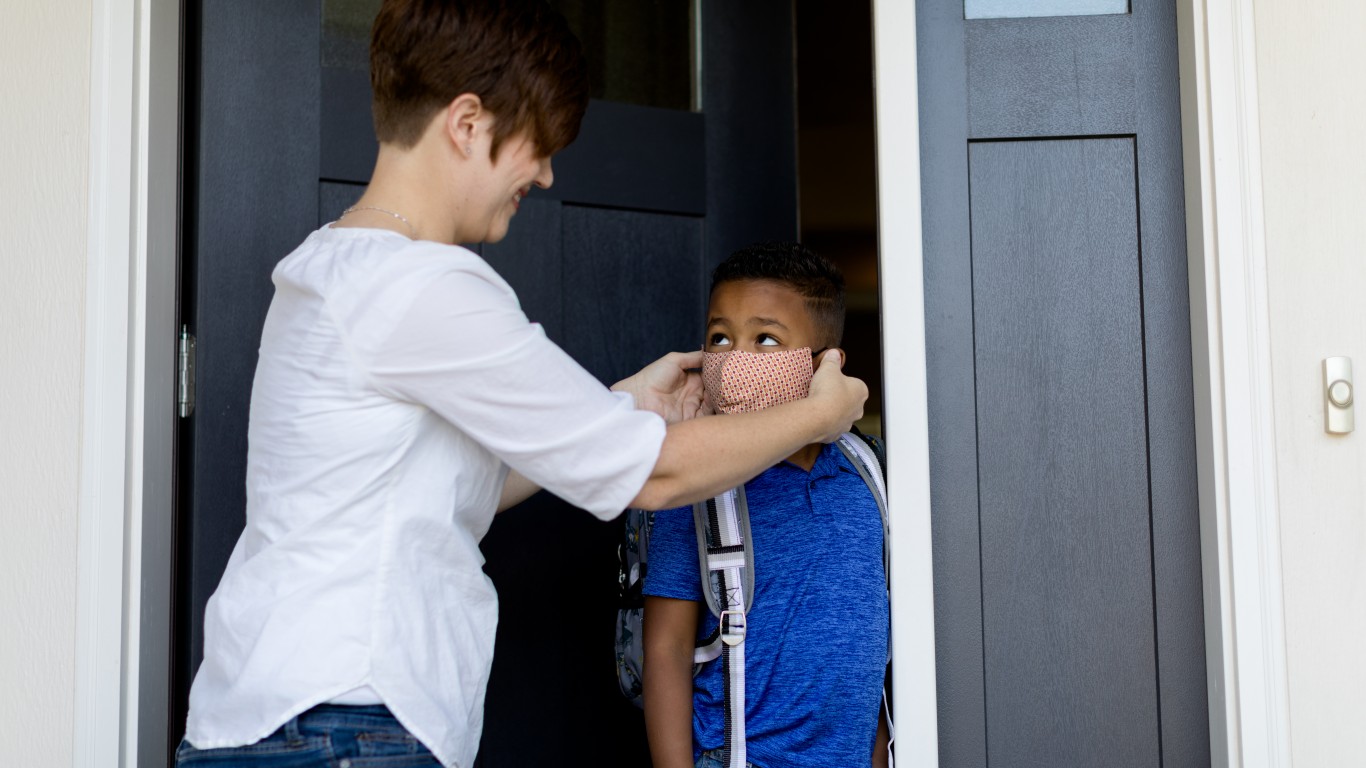
Utah
> Measures taken: Teachers are now eligible for COVID-19 vaccinations. Salt Lake City won’t reopen junior high and high schools for in-person instruction until teachers can get vaccinated.
> Health screening recommendations: For students and school staff to self-monitor for symptoms
> COVID-19 cases as of Jan 26: 10,669 per 100,000 people — 3rd highest (total: 337,264)
> Change avg. daily cases, Jan 18 – Jan 25: 3.8% — 22nd smallest increase (from 324,919 to 337,264)
> Population: 3.2 million
[in-text-ad-2]
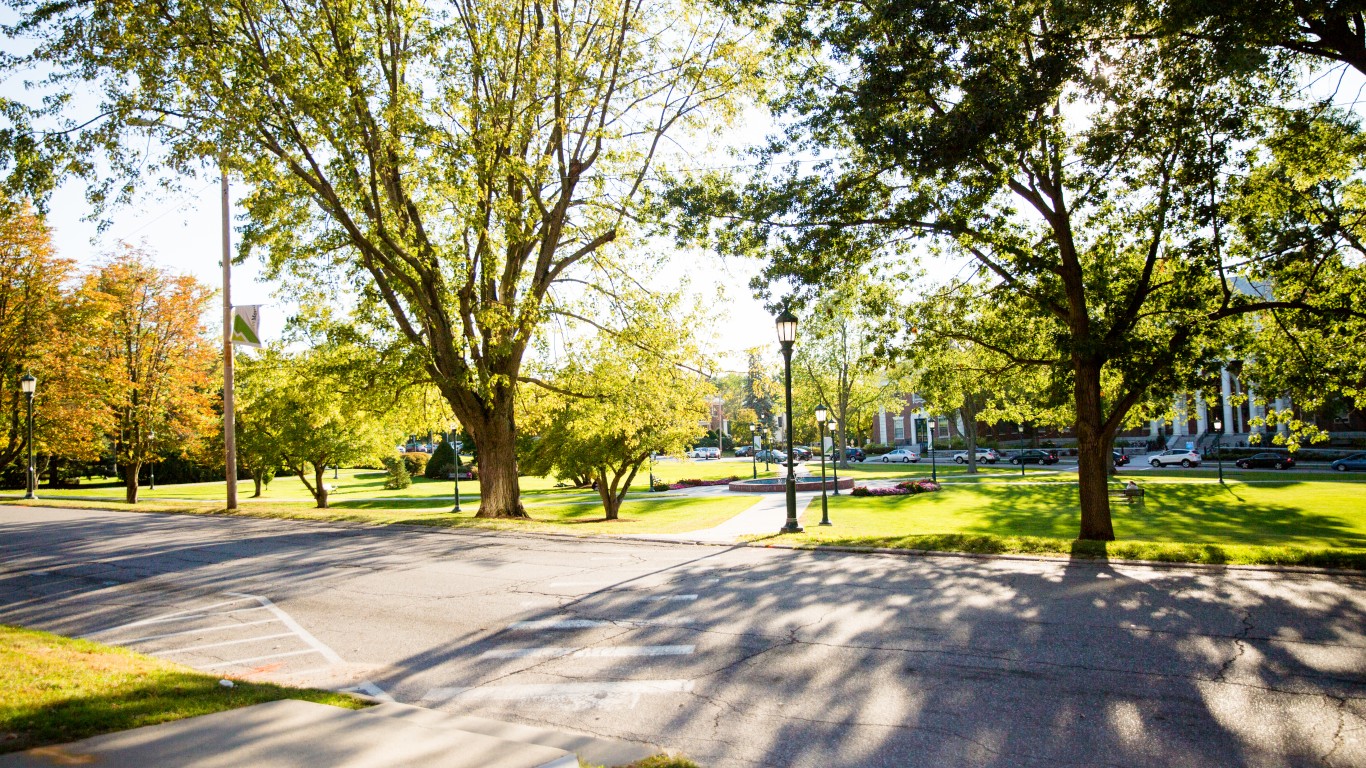
Vermont
> Measures taken: Asymptomatic teachers and staff members at all public schools in Vermont can take an on-site COVID-19 test.
> Health screening recommendations: Daily symptom screening at home
> COVID-19 cases as of Jan 26: 1,802 per 100,000 people — 2nd lowest (total: 11,285)
> Change avg. daily cases, Jan 18 – Jan 25: 9.2% — 2nd largest increase (from 10,220 to 11,165)
> Population: 626,000
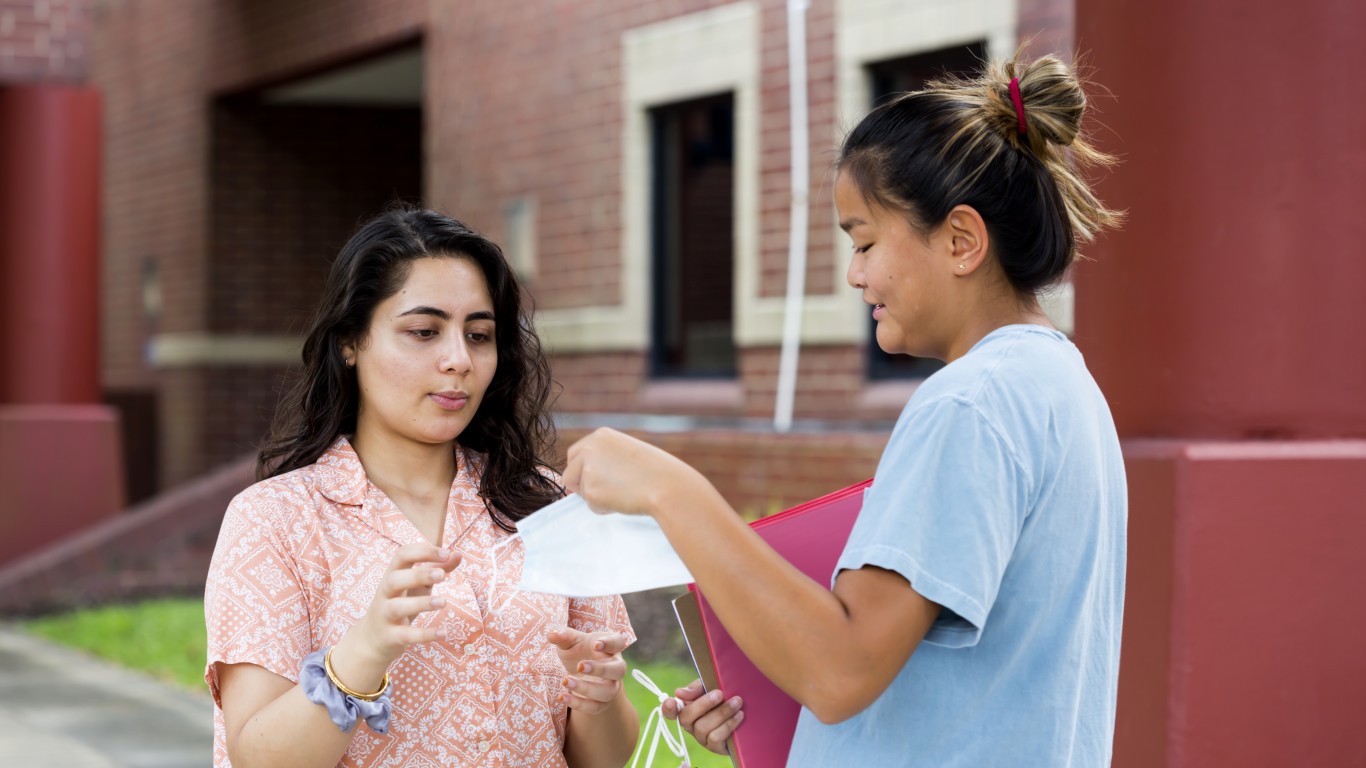
Virginia
> Measures taken: Henrico County Schools delayed in-person reopening. Fairfax County Public Schools moved some students to full-time remote learning. A school in Bedford County closed for a week due to concerns over the spike of new coronavirus cases.
> Health screening recommendations: Daily symptom screenings
> COVID-19 cases as of Jan 26: 5,674 per 100,000 people — 7th lowest (total: 483,326)
> Change avg. daily cases, Jan 18 – Jan 25: 7.2% — 7th largest increase (from 446,550 to 478,619)
> Population: 8.5 million
[in-text-ad]
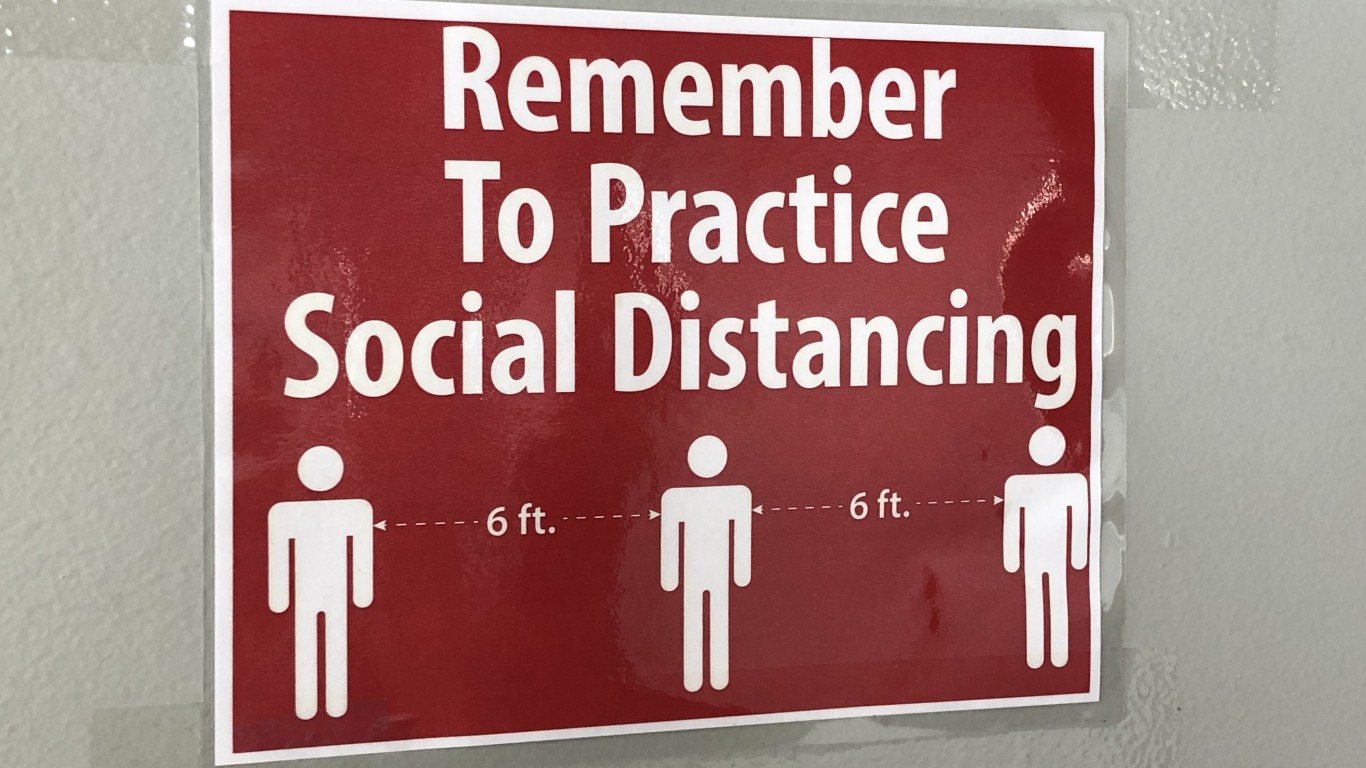
Washington
> Measures taken: Health officials recommended holding off on expanding in-person learning due to resurgence of COVID-19 cases. Public school in Seattle won’t open for in-person instruction until Jan 28.
> Health screening recommendations: Daily symptom screening and temperature checks
> COVID-19 cases as of Jan 26: 4,010 per 100,000 people — 5th lowest (total: 302,141)
> Change avg. daily cases, Jan 18 – Jan 25: 4.2% — 23rd smallest increase (from 289,939 to 302,141)
> Population: 7.5 million
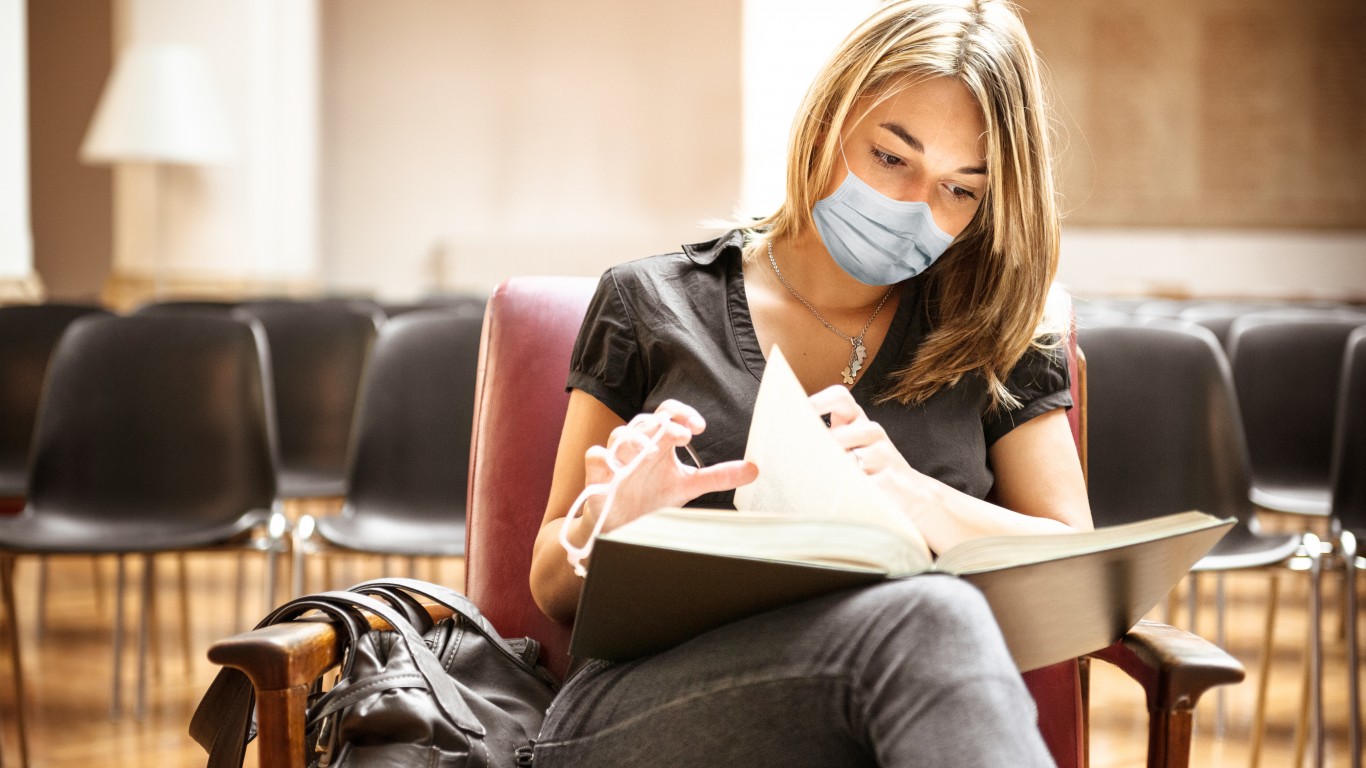
West Virginia
> Measures taken: Elementary, middle, and many high schools started reopening for in-person instruction on Jan 19.
> Health screening recommendations: Daily symptom screening and temperature checks
> COVID-19 cases as of Jan 26: 6,478 per 100,000 people — 11th lowest (total: 116,978)
> Change avg. daily cases, Jan 18 – Jan 25: 5.5% — 16th largest increase (from 109,809 to 115,839)
> Population: 1.8 million
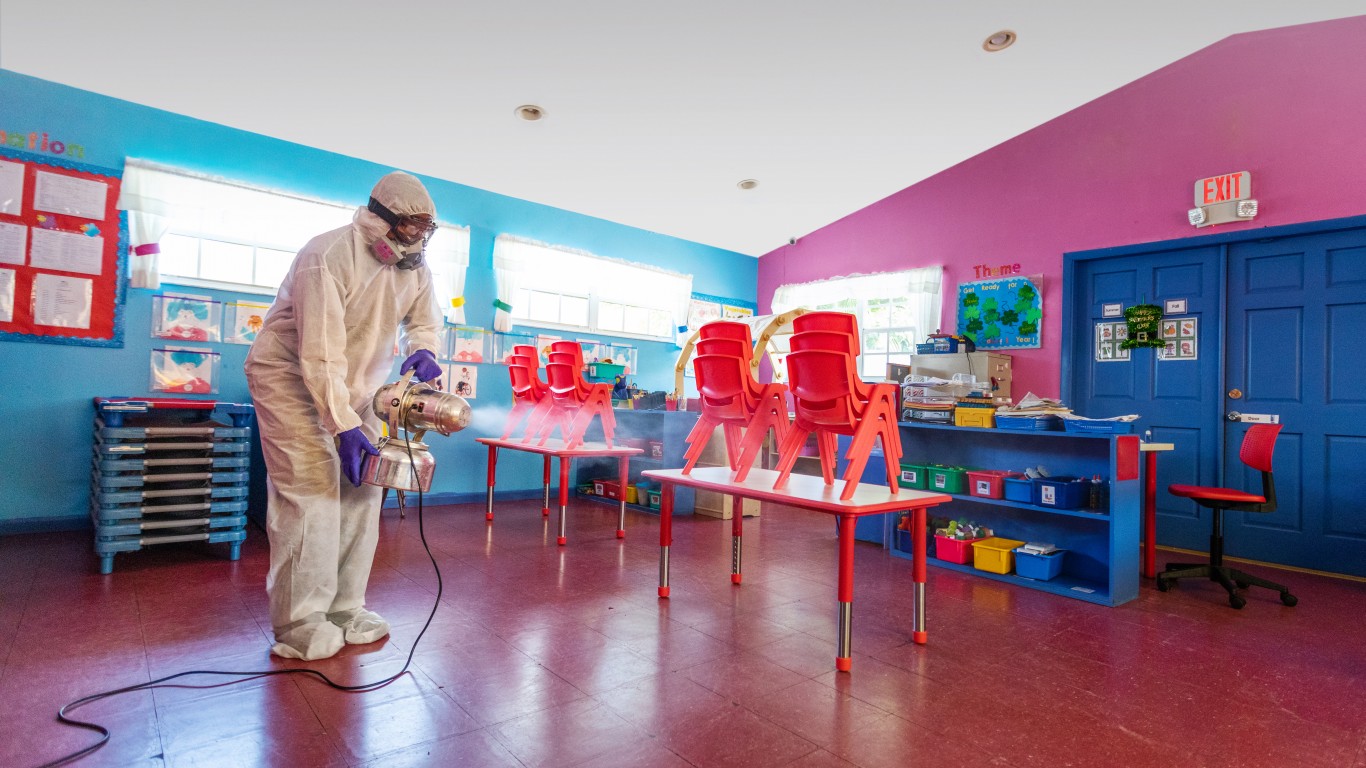
Wisconsin
> Measures taken: Schools in Racine, Wind Point, and Elmwood Park were closed until Jan 15. Appleton Area School District, the state’s sixth largest, started to open schools for in-person instruction on Jan 19.
> Health screening recommendations: Daily symptom screening and temperature checks recommended
> COVID-19 cases as of Jan 26: 9,184 per 100,000 people — 12th highest (total: 533,917)
> Change avg. daily cases, Jan 18 – Jan 25: 2.1% — 4th smallest increase (from 522,877 to 533,917)
> Population: 5.8 million
[in-text-ad-2]
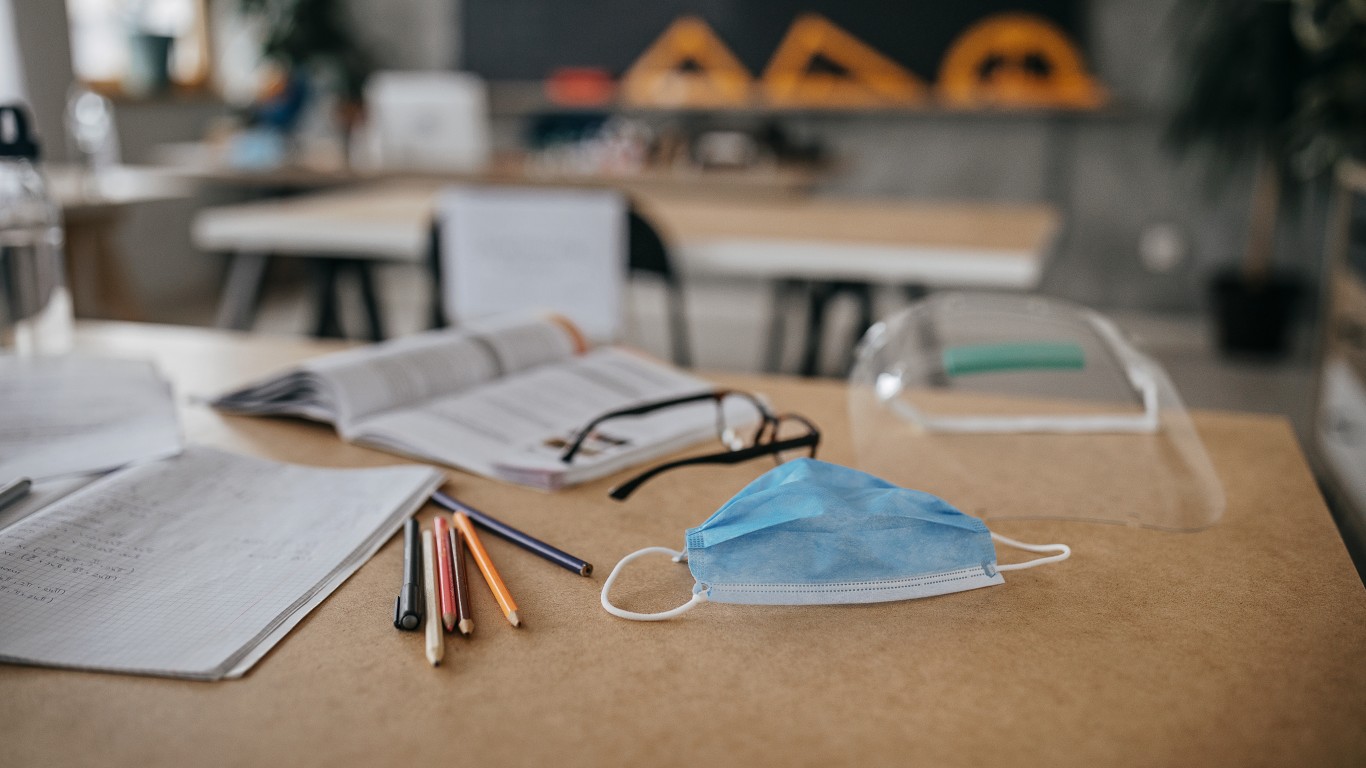
Wyoming
> Measures taken: Students don’t have to quarantine if, when exposed, both the infected student and close contacts were wearing face coverings.
> Health screening recommendations: Each school district to come up with its own safety measures
> COVID-19 cases as of Jan 26: 8,838 per 100,000 people — 18th highest (total: 51,062)
> Change avg. daily cases, Jan 18 – Jan 25: 2.7% — 10th smallest increase (from 49,708 to 51,062)
> Population: 578,000
Finding a qualified financial advisor doesn’t have to be hard. SmartAsset’s free tool matches you with up to 3 fiduciary financial advisors in your area in 5 minutes. Each advisor has been vetted by SmartAsset and is held to a fiduciary standard to act in your best interests. If you’re ready to be matched with local advisors that can help you achieve your financial goals, get started now.
Thank you for reading! Have some feedback for us?
Contact the 24/7 Wall St. editorial team.